#also they both have romantic interest in an esper. so they can talk about that
Explore tagged Tumblr posts
Text
opening this with the obligatory "AUs are fun" and "you can do whatever you want forever" i'm talking about the canon relationship and characterization vs a very common fanon. so without further ado i present:
Dimple Was A Friend: A Friendship Manifesto
the fanon in question is "Dimple as Mob's Dad/Uncle figure". in general i'm tired of the fandomized “Found Family” but in this particular case it totally fucks over an entire series spanning character arc and removes the interesting nuance from Dimple and Mob's relationship.
one of Dimple's big hang-ups is that he thinks all of his relationships have to be hierarchical in some way, but broccoli arc’s whole thing is that he actually wants someone to respect and acknowledged him as an equal.
normal humans can't see spirits at best and are terrified of them at worst. most other spirits we see have degraded to mindless monsters. espers more or less treat spirits as animals, specifically as pests or pets. spirits are dehumanized to the point that Matsuo doesn't seen any problem treating Human Man Mogami like a particularly unruly pet. so if Dimple can't be treated like an equal then he can at least try putting himself at the top of the food chain. no one respects him as a person, so he'll make them respect him.

Mob is in a very special place re: attitudes towards spirits off the bat. he's grown up with the supernatural as a normal part of life and sees no significant difference between humans and spirits. at first is doesn't seen like he's treating Dimple with any sort of respect, but in retrospect it's exactly the sort of thing Dimple wants. Mob doesn't treat him like a pest, he treats Dimple like an annoying guy that's following him around. even as their friendship develops Mob doesn't treat Dimple as though he's become useful, he trusts Dimple like he would Reigen or Ritsu or any other friend in a dangerous situation.

but despite his newfound Friendship Emotions Dimple still hasn't broken out of his old mindset. there must be an inherit hierarchy to the world, and while he can't afford to lose his spot, maybe he can trust someone to be by his side.

Dimple himself repeatedly states in the broccoli arc he wants them to become co-cult leaders. he doesn't want Mob to join him as a subordinate or apprentice or anything like that, he want's Mob to join him as an equal. father/son and uncle/nephew relationships are inherently hierarchical! that doesn't necessary make them bad, but it's not want Dimple wants.
if we accept that Dimple is a father/uncle figure to Mob then the broccoli arc concludes with Dimple realizing he doesn’t want authority over people in a malicious way, he wants authority in a nurturing way. not only is that still an unequal relationship, nurturing is definitely not a word that comes to mind when discussing Dimple.

it also means we must accept that Mob sees Dimple as some kind of authority figure which is simply not true. Mob never treats him with that elevated level of respect and even gets confused that Dimple thinks their relationship is weighted in one way or the other. all in all the father/uncle interpretation is straight up out of character for both of them and downplays mp100’s emphasis on friendship.
and then it creates a second problem. since Mob & Dimple have been shoved into the Family Box that means by order of elimination Reigen is Dimple’s closest friend (or more commonly romantic partner) compared to Mob for most of the mange Reigen doesn't really treat Dimple with the same human-to-human attitude. he frequently makes jokes about Dimple being a like pet, which to Reigen is just normal snark, but probably hits Dimple harder than he realizes for reasons stated at the start.
hell during the separation arc Dimple took Mob’s side and was perfectly fine ditching Reigen even tho he didn’t really have to. he was even mean about it!

during this short exchange they're both antagonizing each other but i feel like it's notable Dimple only leaves after Reigen starts shit talking Mob. Reigen is right that Mob won't use his powers in normal day to day life and Dimple knows he's right. Dimple's been following Mob around this whole time watching life a perfectly average life. and then Reigen, no psychic defenses, charismatic guy with an established following, offers Dimple join him! oh boy is that an easy situation to take advantage of!! (and also of an example of how Dimple's started to lose sight of his "villainous schemes", but that's a whole other tangent lol)
Dimple only reaccepts Reigen into his social circle after witnessing him and Mob reconcile. by downplaying Mob and Dimple’s friendship Reigen becomes Dimple’s closest connection by default which is just not true for most of the manga, but, and i'm about to have a grouchy aromantic moment here, most people are fine with it because Shipping. now Reigen and Dimple can be Mob’s dads together :]
the power of Reigen being a fan favorite typically causes people to elevate him, sometimes even in scenarios he's not all that involved in, but please allow me to point out how amatonormativity plays into this particular reading 😒 Dimple Is Mob's Dad/Uncle doesn't always go hand in hand with ekurei of course, but i see it happen often enough to be a trend. even though a family-esque relationship should logically still emphasize their personal bond just as much as a platonic one, in this case it still typically comes with shipping, and by extension Reigen, tacked onto it.
mean aro moment over. if it sounded like i'm dissing ekurei i promise i'm not! i like it just as much as the next guy! it's just that, like all ships in every fandom, sometimes it gets pushed to the detriment of other relationships and even characterization.
but anyways. in closing: guys. they literally call each other friends.

that's it! thank you for reading my rant ❤
if you've made it this far i wanna peel back behind the scenes for a sec (because i've been trying to write this thing for so long orz) and let you know the term "Friendship Manifesto" is a play on ye' olde fandom Ship Manifestos, which i think we need to bring back in new and exciting ways. classic shipping manifestos. friendship manifestos. qpp manifestos? enemies manifestos?? should we bring back the term "drift compatible" or perhaps even the quadrant shipping system???? we're not taking proper advantage of this meta format. we need to have fun and go crazy with it.
109 notes
·
View notes
Note
hey!! i really like your blog and all of your thoughts about haruhi the franchise are so interesting but what I'm curious about is how do you feel about koizumi in general? you speak about him very rarely but he's my fav character and you're my fav tumblr account so far so i wanna hear it if you have something to say about him ahah
aaaaaa thank you! i'm glad people like my particular brand of nonsense and screaming loudly into what i initially thought was a void. gotta say, being called someone's favorite tumblr is an honor i never thought i would receive from anyone
so yeah, i mostly talk about koizumi on here to give him shit, but honestly that's partially because i find it funny that after mikuru gets promoted from being nothing more than the universe's punching bag he basically takes her place in terms of 'character that suffers for comedy' (see: random numbers and seven wonders in particular), and partially because the text gives us very little of him seemingly being genuine without some level of bullshit attached to it.
like i said yesterday, i don't dislike any of the brigade; koizumi would probably be classed as my least favorite, but it's not so much because i dislike him and more because he never gets the narrative focus that would bring him up to the same level as mikuru
we never really get something that eqates to love at first sight or the melancholy of mikuru asahina for koizumi, and certainly nothing on the level of disappearance or intrigues (which i would argue are the yuki and mikuru spotlight novels, respectively)
(melancholy and surprise i would class as haruhi spotlights, one before and one after her character development; and sigh i would class as 'establishing material that is necessary but not exactly fun to sift through for the most part')
i like to think if we ever get another long-form book it'll be koizumi-centric, mostly because i'd like to see him actually get to be a major player! it's getting a little sad to watch kyon hear him go "maybe i wanted to time travel" and just go "i mean what could koizumi possibly want from me"
but really, the only koizumi spotlight we have is the tempo loss bishop exchange--which, notably, while i take it as canon (as it was authorized) was not by tanigawa; if i remember right, it was instead written by sou sagara
i read a fan translation, as there's never been an official release and my relationship with the official haruhi translations is reasonably antagonistic on a good day, and i think it's worth noting that for the first page and a half i didn't think there would be a plot. i thought it was just koizumi's philosophical bullshit, novelized.
that said, it was really fun to read something from his perspective (kind of like how editor in chief gives us insight into yuki and mikuru via their writing styles; but more direct)
so, before i get into my own thoughts (which i believe i've touched on before), it's worth noting that while the entire cast of haruhi can be easily read a variety of ways, koizumi is arguably the easiest to do this with because we get so little to work with in terms of "things we know to be true"
things we know for sure are true about koizumi: north high student (presumably a teenager), esper, works for a mysterious organization, considered attractive/popular (unless i'm misremembering something), has explicitly stated that he's always putting on an act but has never clarified how much and in exactly what way, earnestly offers advice but often contradicts himself, claims to be able to read haruhi's mood/emotions/something along those lines, and (in the later books) has made a hobby out of trying to convince kyon to deal with his very obvious romantic feelings for haruhi
my own reading of koizumi is biased by my readings of other characters and their relationships/dynamics; and it's also specifically the one i think is the funniest option: koizumi has a thing for both kyon and haruhi, is aware that neither of them views him the same way (with haruhi viewing him solely as a subordinate and only really paying attention when he's saying things she wants to hear, and kyon seemingly regarding him as a friend as well as a source of useful information, but hardly even willing to acknowledge that fact most of the time)
and, since he has accepted that neither of them like him that way but they do very obviously like each other, he's decided that they should get over themselves and get together. unfortunately, kyon's strategy when he hears things he doesn't want to is pretend no one's said anything at all, and so koizumi's words go ignored
#ruby.txt#itsuki koizumi#asks#anonymous#there's an argument to be made that kyon's friendship with koizumi parallels his dynamic with haruhi in some interesting ways#namely in his refusal to acknowledge it and general dismissal of the concept#i don't personally see the romantic undertone of it on kyon's side but i do think it would be a valid reading. and an interesting one!#this ended up being SUPER long#oops!#guess i had a lot more to say about koizumi than i thought
28 notes
·
View notes
Text
more mob psycho age swap. my brain is very interested in emi and reigen interacting for some reason

#my art#mp100#age swap au#mp100 ageswap#reigen arakata#emi#also they both have romantic interest in an esper. so they can talk about that#i have so many age swap ideas#silly and not silly#mob psycho 100#emi doesn't look enough like emi i need to study how to draw her right#very close to starting a side blog for mp100 tbh
7 notes
·
View notes
Note
If the ROs from TA were able to play Palace of paradise who would they choose to romance?
Haha, that's an interesting crossover. There's less characters in PoP then there are in Triaina, so there's be at least a couple overlaps. Let's see...
----
E: I think they'd pick Kia/n. They're not really familiar with the world they've been thrown into by chance opportunity, but they're earnest and well-meaning. It would mesh well with E's sunny enthusiasm and altruistic stance of people. They would be the general do-gooder team up
R: I think they'd pick the no-nonsense detective Blanc/Blanche. Both are extremely perceptive of the environment and it's inhabitants, though R is more focused on people, and Bl moreso on the environment. I think the chilled personality mixing with a more laid back one can work well. Also it would be fairly ironic, as Bl is a detective, and both of R's paths are criminalized to some degree.
L: I think they would be interested in Avi/Ain. An AI developed for romantic intention and also a possible will and desire of its own would be a major focus of intellectual curiosity for one, and I think the AI's purpose and story would resonate very closely with L's romantic nature.
V: weirdly enough, I think they'd choose Esper/Espera. Honestly, I think V would take every outlandish thing they said completely seriously at face value, and that will get them to unknowingly raise the relationship flags. Idk, the idea of Es talking about their demon eye destroying three separate worlds and V just take it as truth at every fantastical turning point kinda sends me.
P: they would probably choose the roommate Lann/Lanni. They both have a heavy competitive spirit and a lot of repressed emotion, just different ones. Though even given that, P would absolutely squish La like a bug. The setting differences are so drastic that a fight between them would be like Mayweather vs a cripple. So thank God the digital world is able to even the odds a bit, because I don't think P would really be satisfied with anyone in this weak lineup of characters.
M: I think they'd choose Orion/Orain. To be somewhat honest, O was made as something of a parallel to M's flirtatious behavior with a different kind of driver and intent, along with a lack of sleepiness. I attempted to make O with the same kind of slowly drawn flirting dialogue M used. So I think they'd be a good match haha.
Ra: this is a bit of a hard one, since I'm not really sure what they would do if the MC didn't exist. I'll go out on a limb and say they would also choose the detective, for a somewhat similar reason but altogether different purpose. The detective is basically the only individual there with both the means and willingness to be a direct danger to Raven's maligned actions, so I think raven would attempt to get close to manipulate and find out where the detective is to cut out any opposition.
S: I think they'd choose Dayta/Dahta, and it'd be a very interesting pair. Why would arguably the dumbest person in Triaina pair with arguably the most intelligent person of the digital world? Well, the answer is that they're kindred rebellious spirits, and even though S wouldn't have the slightest idea as to what data was doin tinkering around with their hackery mumbo, they definitely understand and relate to the problems they have with authority and in taking more criminal means to undermine them. I think their shared ideology makes them an unlikely but achievable duo
F would probably be so insufferable to the characters of PoP that the AI would be hopelessly lost attempting to promise a suitor for them and the hacker would DDoS and IP ban them from the server. There's a very large reason why Fiore is paid the big bucks, and why she desperately bashes you and F together like a kid playing with action figures in the vain hope you will fall in love and F won't be completely appalled by the idea
Thank ya for the ask! I hope you enjoyed
66 notes
·
View notes
Text
The Queen’s Tears
As Celes and company explore an ancient castle on the shore of a subterranean lake deep under the desert, they learn that nothing about the War of the Magi was as simple as it seemed. Even after epic battles have long since been forgotten, the legacy of more intimate moments lingers on. Also on AO3 · Special thanks to @azurefishnets for the amazing prompt!
. . . . .
“And to think that this has been here for the past thousand years,” Edgar mused as he leaned on his crossbow.
Sabin took a deep breath of the cool underground air, which was pleasantly humid and carried the faint smell of running water. “Where do you suppose the light’s coming from?”
“The moss, I assume. There’s a bioluminescent strain in the South Figaro tunnel. It’s not native to the mountains, and I always wondered where it came from.”
“Do you think the lake is connected to the aquifer under the castle?”
“It’s difficult to say,” Edgar replied as he snapped the bow’s limbs closed and holstered the device. They had followed an ancient road leading through the caves winding within the bedrock, careful to stay within range of the ceramic paving stones. Who could know how all the passages were connected? Edgar’s concerns were the sand and the sky, and the people who lived in the present. Whatever this giant cavern might contain, it belonged firmly in the past.
Still, one had to wonder.
“I’ve been reading about the War of the Magi,” he said, “and hiring scholars to do the same. Some have come from as far as Doma, where knowledge of the old tongue has been preserved.”
Edgar glanced at Sabin, who nodded in acknowledgment and – Edgar hoped – approval.
“There’s a theory that all of this was once a sea,” he said, making a sweeping gesture at the vista before them – the stone cliffs, the still and luminous waters of the underground lake, and the monstrous castle rising from the far shore. “Figaro may have once stretched across an archipelago.”
“That would be a sight to see,” Sabin replied, crossing his arms. “And we might see it again in our lifetimes. I assume you’ve noticed how close the ocean has gotten in the past year.”
Edgar had noticed, and there wasn’t a night that he didn’t lose sleep as he turned the matter over in his mind. Every month the storms that swept over the inland sea carved another mile or two from the shore.
Edgar grit his teeth, torn between confessing his anxiety and passing it off as a joke, when he felt Sabin’s reassuring hand on his shoulder.
“It will be nice to have some water to go with all that sand,” he said with a grin. “If anyone can figure out how to make our castle float, it’s you. And we’ll have plenty of time to map out everything down here once we’ve taken care of our business with the Tower. I hear you’ve become quite the expert at escaping from court.”
Edgar let out the breath he’d been holding. “I learned from the best.”
“That’s the spirit.” Sabin’s laughter rolled down the stone path as he set off to rejoin the others.
. . . . . .
Relm sneezed into her hand. It was just her luck she hadn’t brought any tissues. There was a loose ball of rags in one of her back pockets, but they were all thoroughly saturated with turpentine. It was her duty as an artist to see the world, but she’d had just about enough of abandoned ruins. The magic of this place was as thick as pollen in springtime, and just as aggravating to her sinuses.
She sneezed again and wiped her nose with the back of her hand. It didn’t help.
“That’s a disgusting habit.” Setzer produced a handkerchief from the cuff of his sleeve like a magician and offered it to her.
“Don’t be a creep,” Relm countered, but she accepted the handkerchief and blew her nose properly.
“You want this back?”
“Keep it. My treat. Have some of this too.”
He placed a small glass bottle filled with clear liquid into the palm of her hand before she could object.
“This isn’t booze, is it?”
“Don’t be ridiculous. It’s tonic water mixed with mint and a drop or two of ether. I use it for hangovers, but I assume it will work for allergies.”
Relm removed the cork stopper and sniffed the bottle. Small bubbles rose from the liquid, which was pleasantly fragrant. “It’s a placebo,” Relm decided.
“Of course it’s a placebo,” Setzer agreed. “Not even magic works on hangovers. Drink it anyway.”
“Fine.” Relm tilted her head back and downed the bottle in one gulp. The concoction tasted exactly as Setzer said it would – of mint and ether. There was also a touch of citrus, perhaps to keep it fresh.
She sneezed again. “I’m going to sit down for a bit,” she said after wiping her nose. “You go on ahead.”
“I think I’ll sit with you.”
Relm scowled. “I’m not a child. It’s not like I’m going to get lost if you’re not here to watch me.”
“Who said it’s for your benefit? We’ve been walking for hours, and my back hurts. Didn’t anyone teach you to be considerate of your elders?”
Relm shrugged and took out her sketchbook. Setzer wasn’t bothering her, and she’d always liked when people watched her sketch – it was like she could see her drawing through another pair of eyes.
She had been walking with Terra and Celes as they circumnavigated the lake, but she’d allowed herself to fall behind once the path became steeper as it headed uphill toward the castle. It was a stroke of good fortune that Setzer had caught up with her at a particularly good vantage point. Relm made a rough outline of the castle before filling in the details, all the while keeping her eye out for any potential points of structural unsoundness. She was too young to die, although she had to admit that being trapped in the crumbling ruins of an ancient castle would be a suitably glamorous way to go.
Relm glanced over at Setzer, who was neither sitting nor watching her. He regarded the ruins of the castle with a cold and appraising gaze.
“Do you think it will come down on us?” she asked. If anyone would know about things crashing, it was Setzer.
“I doubt it,” he replied. “The magic is so thick in this place I can smell it. Whatever has been keeping this castle standing won’t be affected by our presence. But who can say? With our luck, there’ll be some sort of dragon waiting to meet us in the foyer.” He paused and finally looked down at her sketch. “Notice anything interesting?”
She had, in fact. At the moment she was adding it to her sketch as one of the finishing touches. “I think there might be secret passage.”
“On the lower level, leading into the rock behind the castle? I was thinking the same thing myself. How much would you like to bet that Terra leads us straight there?”
“I don’t gamble,” Relm replied primly as she stood up and closed her sketchbook. “It’s a disgusting habit.”
. . . . . .
Terra sat on a stone bench in the castle gallery, watching as Relm and Celes studied the ossified body of Odin. Neither of them appeared to have noticed that the magic of the stone was sealing the entrance to a secret passageway. She’d bring it to their attention once they finished their examination.
“So this Esper was supposed to be the queen’s knight?” Relm asked with a frown.
“Who wouldn’t want to have a bodyguard like this?” Celes slapped one of the statue’s meaty thighs. “Just look at this big boy.”
“Do you think they were, you know…?”
“They were,” Terra confirmed. They both turned to look at her.
Celes’s surprised expression softened into a smile. “That must have been so romantic, being in love with someone you saw every day but could never touch.”
“Think of the pining,” Relm agreed with a sage nod.
“Oh, but they did touch each other. They could even have had children,” Terra corrected them. “It would have been possible. I remember that was something my parents worried about, but their concern turned out to be groundless. They had me, after all.”
“Wait, hold up,” Relm objected. “You remember your parents talking about how they were worried about having children? Wouldn’t that have happened, like, before you were born? How could you remember something like that?”
Terra was confused by the question. “Doesn’t everyone have memories from before they were born?”
Relm’s eyes went wide, and Celes laughed. She crossed the room and sat down next to Terra before throwing her arms around her shoulders.
“You beautiful creature,” she said, kissing Terra’s cheek and smoothing back her hair. “Never change.”
“Is that an Esper thing?” Relm asked as she joined them, sitting down on the other side of Terra. “That’s not fair! I want to have an Esper father too. Hey Terra, do you think my dad might have been an Esper?”
Terra looked into the past. It was right there beside them, after all, spreading behind them like a rich and vibrantly colored shadow. She could see who Relm’s father was, and she could see the moment when Relm discovered his identity for herself, but she decided not to say anything. She liked to keep some ‘Esper things’ to herself, after all.
“Perhaps,” Terra offered. She paused for a moment and decided to add something a bit more human. “No matter who he was, I’m sure he loved you very much.”
. . . . . .
The dragon guarding the sealed passage leading away from the castle had been a pathetic thing, old and weak from hunger. Its tired eyes had been milky with age and neglect. Celes felt bad about killing it, but it refused to let them retreat once it had spotted them.
The chamber that housed the statue of the ancient queen was a mirror of the gallery where Odin had made his last stand. Celes held what remained of him in her hand, watching his magicite sparkle as its facets caught the light. When called, his spirit had sprung from the stone, riding a horse that had not been a horse, not with teeth like that. He wielded his sword not with grace or finesse, but with absolute power, as one of the old gods might have wielded a gale wind to cleave a mountain in twain.
Celes didn’t know what sort of wizard it would take to turn bring Odin to his knees at the height of his prowess, but she could make a guess.
She leaned back against the stone wall. The bench she sat on was oddly warm. The moss from the tunnel connecting the lower reaches of the castle to the outlying cave system had made its way inside, and patches of luminescence spread across the dips and planes of the vaulted ceiling. The queen’s statue seemed to emit a soft white radiance into the dim interior.
Celes felt rather than heard Sabin approach. Even on the marble floor, his footsteps made no sound.
“Celes?” he called out. “Are you okay?”
“I’m fine,” she responded. “Is it time to leave?”
“There’s no hurry. Edgar and Setzer are arguing about something, and Relm and Terra are doing a spot of art appreciation. I just came to check up on you.”
“Thanks.” Celes moved to the side, offering Sabin a place beside her. He took it, sighing with relief as he sat down.
A few moments passed in companionable silence. “That was an impressive performance against the dragon,” Sabin said eventually. “I can’t seem to summon Espers for the life of me. Is there a trick to it?”
“No trick, just years of training.”
“I can imagine.” He laughed softly and shook his head. “Or I can’t, not at all. I’ve done my fair share of training, but what you went through must have been on a different level entirely. It paid off, at least.”
“I guess it did,” Celes replied, and Sabin didn’t pursue the matter. She appreciated that about Sabin – he never judged her for anything she’d done, past or present. Not for anything she would do in the future. How rare it was to find someone who only thought the best of you.
Or perhaps it wasn’t rare at all. Perhaps Sabin was normal, and she was the anomaly.
“It was always difficult, after the injections.” The words left her mouth before she realized what she was saying. Sabin nodded to show that he was listening, but he didn’t reply with any questions or comments. Celes decided to keep talking.
“It was dangerous – extremely dangerous – before Cid perfected the process. People died from the injections, and many of those who didn’t had to be euthanized afterwards. I wasn’t supposed to watch, but sometimes I did. I was horrified by how magic transformed the trial subjects, but I was never afraid that what I saw would happen to me. It might have been because I was so young, but the injections never hurt me in the same way they hurt the adults they were tested on – first prisoners, and then soldiers.
“It was the same with Kefka, at least at first. The experiments must have caused him terrible pain, but he never showed it. You might not believe this, but he was always cool and level-headed. I couldn’t tell you why he had such a natural tolerance for the injections, I never paid much attention to the science. Kefka tried to explain it to me himself with some analogy involving blood types, but there were too many words I didn’t understand.
“Kefka was never gentle, not in the way Cid always was, but he was kind, in his own way – or he was kind to me, at least. Then something happened. That was right around the time Vector began its preparations for war, and I think it had something to do with the emperor, but who can say?
“Whatever it was, Kefka began to take injections more frequently, sometimes even daily. Eventually he started to lose control. That’s when I learned to absorb magic. Kefka taught me the technique himself. If he hadn’t, the entire lab would more than likely have been destroyed.”
Celes shook her head. “There was something Kefka wanted, and he would do whatever it took to get it, even if that meant he lost himself along the way. Maybe he meant to destroy the Empire all along, and maybe he trained me to…”
Celes couldn’t bring herself to finish the thought: Maybe he trained me to stop him. She had failed once, but she might still have a chance. It would be a mercy, she told herself.
“Do you ever miss Vector?” Sabin asked, subtly changing the subject.
“No,” Celes replied. She didn’t think she was lying. “When that tower falls, I’m going to go back. Don’t laugh at me, but I want to plant trees. Over the whole mess, so that no one will even know it’s there in another hundred years.”
“I’m not laughing.” Sabin smiled at her. “Once you’re done, feel free to come visit us in the desert. You’re not the only one with ghosts in the basement, after all. We could use some trees here too.”
Celes stood up. It might take another thousand years, but one day all of this would be buried – the terrible things that happened in Vector, whatever terrible things had happened in this castle, all of it.
“What do you think happened to the evil wizard who turned Odin to stone?” she asked as she approached the statue of the ancient queen.
“She doesn’t look so evil to me,” Sabin answered, confirming her suspicions. “The choices we have to make aren’t always so easy, even in hindsight. We do what we can.”
“He must have really loved her,” Celes murmured. Odin’s magicite began to glow and hum as she drew closer. She held it out like an offering and watched in amazement as tears pooled in the statue’s eyes. They fell onto the warm crystal like drops of light.
“We do what we can,” she agreed softly.
#azurefishnets#Final Fantasy VI#Celes Chere#Terra Branford#Relm Arrowny#Edgar Figaro#Sabin Figaro#Setzer Gabbiani#my fic
25 notes
·
View notes
Text
So I watched A Certain Magical Index/Scientific Railgun
You might have heard of this series of anime, especially from Gigguk if you follow any anime youtubers. This anime takes place in a futuristic setting where people are born with abilities that they can train to become more powerful with those abilities. If you don’t train your ability at all it might as well not exist and you’re just a normal person. If you do train it though, you are considered an “esper”. Espers are able to train their abilities at Academy City. This city is literally a massive school campus dedicated to espers and using espers for technological development. Because of this, academy city’s technology is several decades ahead of the rest of the world.
On the other hand, apparently religious people have been able to do magical stuff like casting spells and summoning. This magical power is unknown to most of the world besides these religious people. This magic cannot be used by espers for reasons unknown.
I haven’t even gotten into what the actual anime is like yet and that’s because of how important the world building is to this anime. Everything I just explained is just scratching the surface of that world and I’m really just getting that out the way so I can actually talk about this anime. If world building explanations aren’t your thing then don’t worry, this anime doesn’t focus too hard on it. It spreads out its information and uses the characters it introduces to expand upon its lore instead of having the main characters loredump whenever it is convenient.
First, I’ll talk about A Certain Magical Index. This anime focuses on Touma. He’s an esper who is Level 0, meaning his ability pretty much isn’t trained at all. There isn’t really much to his character besides his motivations. He just wants to protect people (especially his friends) from danger and is quite literally the personification of a “good” moral compass. On the other hand he’s just a lazy teenager who has bad luck syndrome. I talk about these things separately because Magical Index tries to be both an action-packed shounen anime and also a slice of life harem comedy.
A lot of characters from Magical Index suffer from this problem. The characters can be caught in a lot of dramatic situation where multiple lives are at stake. They’re struggling to defeat some crazy villain, shouting morals at their opponent, standing up after getting beaten down countless times, kicking, screaming, crying, and then the show just turns into the most generic harem shenanigans that only hurts the impact of the characters more than anything. It can make the anime very tone deaf at times.
It sucks especially because this show isn’t bad, the stories are mostly interesting and the battles that go down are very entertaining, but its “comedy” is just mostly disappointing. Plus, the harem makes it harder to believe any of the romantic relationships going on with any of the characters. In fact, the best characters in Index are usually the ones that don’t or rarely participate in the harem. For example, “Accelerator” is a character that has a pretty amazing story arc overall. Magical Index even sometimes has episodes that focus primarily on Accelerator. Following the side characters is the best part of Index and that really holds back this show from truly being good for me.
RAILGUN however is a whole different beast. It also has the Index’s issue of being an action packed drama while also being a slice of life comedy, but it handles it MUCH better. The comedy is not centered around it being like a harem, instead it’s much less generic. The main characters shine a lot more in Railgun and even Touma’s characters seems way cooler than he does in Index.
Anyway, Railgun focuses on Mikasa. She is a level 5 esper, and level 5 is the current highest level for an esper, so she is of the most powerful espers in Academy City. Her character is one that is troubled by her own powerful abilities and how it affects her relationship with other people. She tries to hide her problems and deal with them all herself and it makes for a lot of interesting stories as some of the dark stuff that Academy City does gets exposed. The Railgun stories usually affect the entire show’s run time. Railgun season 1′s first story arc affects the second story arc.
Not only is the main cast for Railgun interesting, but so are all of the villains. Some villains are super generically evil, but they work as antagonists because of how they affect other characters and how they expose problems within its world. Railgun’s stories are much more memorable to me, even if its stories don’t affect the world as much as Index’s stories do. Heck, Misaka shows up and Index as well, but she only ends up coming off as a dumb tsundere character instead of how much she matters in her own anime.
Index & Railgun’s story intersect often and take place at different times, which can lead to some confusion. Luckily though, it isn’t very confusing on where someone should start in watching the show. Watching Index seaon 1 and Railgun season 1 is a good enough place to start. Index’s stories focus on the magic/religious side of the story. It depicts a character dealing with issues outside of Academy City. Railgun’s stories focus on issues happening within Academy City. The world building focuses more on just Academy City more than anything else. Certain stories happen at different times, but it’s never too confusing as long as you watch the first seasons first.
I know I was talking about the negatives a lot, but the negatives stop here. There is a lot of characters across the series and it would be genuinely hard to not like most of them. At least 2 of these characters will appeal to you as they tackles a lot of different topics with them. It’s honestly amazing that I can understand this entirely different world and think about how I would act in a world like that. I can think about what if scenarios of a character doing something a little different. What if a certain character was a level 4 instead of level 0? What if 1 character was actually a magician instead? Not only this, but there are also a ton of unanswered questions in the show that keeps people around. There are so many unresolved points that you just have to see how something plays out. I’m surprised this show isn’t bigger than it is. Clearly, people know about the series, but it doesn’t get talked about as much as something like Attack on Titan or Fate even though the series is still going to this day. Railgun is airing its 3rd season as of writing this. The animation in this show is pretty consistently high quality (except 1st season Index, but too b e fair that’s pretty old), the music is REALLY good. Some of the music is actually pretty iconic and you might have heard it from other media. I’d highly recommend this series to other anime viewers who haven’t seen it yet. Go watch it if you need a new series to get hooked to. If Index is bothering you for some reason just watch Railgun :V
#text#anime#review#a certain magical index#a certain scientific railgun#I didn't even mention acclerator's anime but that one is very well done too#except watching it makes no godamn sense if you havent seen index or railgun
8 notes
·
View notes
Text
My Flowers Were For You ch 3
Also on Ao3!
Warnings: Emetophobia, Hanahaki
Shigeo had been surprised to find that he liked running. He'd never been physically inclined the way Ritsu is and he couldn't use his powers on his own body the way Hanazawa always would without making himself sick. He likes this, though, likes the easy mechanical motion of swinging his limbs back and forth and moving forward without any kind of psychic interference. The bi club runs in front of him, giving him a goal to catch up to, and the rallying cry keeps his mind from wandering too far.
Kageyama, I think I'm dying. Takenaka doesn't take to it quite as well. Shigeo turns and he's right next to him, somehow looking exhausted despite barely being out of breath. Takenaka isn't able to keep up with the rest of the bi club (not for the whole route, anyway) so he alternates between either running with Shigeo or in the middle on his own. Yes, you kind of look like you might be dying. Shigeo had been hoping that the lines and bags under his eyes were just occasional. Things brought on only by particularly bad nights of laying awake and trying to shut out every other headful of thoughts. They've yet to disappear or even lighten in the weeks they've known each other, though. Takenaka just snorts at him, mumbles a quick sarcastic thanks between breaths. Just like the running, he's surprised to find that he likes the telepathic communication, too. Shigeo knows that he doesn't emote very well and he's more or less made peace with that fact. It's hard to make faces to go with your emotions when you have none. (The two of them pass and wave to Ritsu, walking with those two other boys from the student council, and the phrase worth it, worth it, worth it repeats in his mind.) Mind to mind like this, though, is easier for him. It cuts out a lot of the middle man.
Takenaka suddenly pales next to him and steers off course into the grass, coughing and retching painfully. Shigeo slows and turns back for him, awkwardly patting Takenaka's back the same way he had the first time it happened.
It makes this a lot easier, too, the times when one or both of them can't talk over the rawness of their throats.
Are you alright?
I'm fine. Someone's not having a very good day, though. Takenaka eyes the wilted yellow carnations, the rejection, laying in a pile at his feet with distaste. Shigeo looks at the neon band-aids scaling up and down his own arms, but he can't seem to muster up the same disdain. Not when it's a physical proof of something important to him.
(He wouldn't admit it, not out loud. He wouldn't put the thought out into the light where other people could see it, because there's nothing to be done for it, anyway. It's not worth it. He lost the right to complain when he decided other people's safety was most important. It was his own decision and his own choice. But well…
Sometimes he thinks of when he and Dimple had first met. Of not being able to laugh or be effected with other people, of ‘You'll be forever alone.’ And suddenly a disease that could only be borne of romantic affection doesn't seem so terrible.)
“Blegh.” Shigeo looks up just in time to catch Takenaka scraping his teeth across his tongue and dragging his sleeve across his mouth. He sputters out one final bout of yellow petals before straightening up again.
This was our last lap anyway. Do you want to get tea when we're done? Shigeo has noticed that if he offers to buy, Takenaka will fuss, but eventually accept. If he doesn't say anything, though, Takenaka will instead just go without and walk home with a sore throat.
Takenaka looks at him for a moment before he nods. Minimal fussing today.
Shigeo gives a minute nod in return before gravitating back to his side to walk the rest of their cool down lap. He's just close enough to hear music coming from the one earbud dangling around Takenaka's neck, the small noises in the back of throat as he hums along.
What are you listening to?
A love song. This sounds a lot more promising than most of his music. (‘A sad song, a lonely song.’) ...Do you want to listen, too?
Takenaka must be able to Feel his interest. Shigeo nods ands accepts the earbud given to him, the two of them walking almost shoulder to shoulder so as not to pull the cord.
If we'd only stayed together, I might not have fallen apart. But the words you served destroyed my planet.
Shigeo, through spending four years of time with one Reigen Arataka, has become the master of giving side eye.
I stall before I start,
I stall before I start anything at all.
...What? It is! ...Don't give me that look. Shigeo isn't actually sure of what exact look he's giving, he never is, but Takenaka seems to understand the feeling behind it regardless.
The song changes over to something else, Takenaka still humming quietly and Shigeo occasionally joining him.
Takenaka misses a day of club the next week.
And the next week he misses two.
And the week after that he misses four.
They aren't in the same homeroom, so Shigeo is never sure when he's gone until the end of the day. From what he's heard, Takenaka always disappears during lunch period, too, so he doesn't know where to look for him, then, either.
“D’you think he's avoiding us?” Kijibayashi keeps eyeing the empty seat next to him.
“Hmmm...probably. For as much shit as he talks, Takenaka is maybe the flighty type.” Tome tips her chair until Saruta reaches around and pushes it back onto all four legs for her.
Shigeo doesn't really want to assume Takenaka is keeping away from them (from him) on purpose...but there have been an awful lot of days where he's seen him dragging himself through the front gate in the mornings, only to be absent from afternoon club. Maybe Takenaka is more like other people than he thinks he is. Shigeo slouches slightly more, half-empty water bottle crinkling in his grip.
Maybe this is his way of telling him to get a clue.
It hurts a little more than he thinks it really needs to.
The telepathy club disbands for the day and Shigeo is just distracted enough that he startles when Tome grabs him by his shoulder.
“Oi, Mob. Are you working tonight?” Shigeo shakes his head. “Good. Because we-” Oh no. “-are going telepath hunting.”
That hadn't been what he was expecting. He and Tome hadn't done that for months now. “I sent that telepathic signal pretty far the last time, though… I think Takenaka and Ritsu's two friends might be the only telepaths in Seasoning City.” Besides, he knows now that he can't Sense telepaths the same way he can other espers. There had been one in his school for two years and he had never known.
“Don't worry about that. Because we already know where one lives! He's definitely hiding there. Now we've just gotta go get him and drag him back out.” Tome pounds her fist into her open palm in a way that makes Shigeo wonder if Takenaka is going to have much choice in the matter.
Being the only one that's seen Takenaka's apartment from New Year's, Shigeo doesn't have much choice, either. He doesn't truly mind, though. Tome is bright and loud and she never seems to care that Shigeo is neither of those things. She even seems to like him that way.
It's almost a twenty minute walk to the cheery yellow building from Salt Middle School.
“Hmmm…”
“Don't think too hard over there, Mob. You'll blow a fuse,” Tome teases, tugging on where their elbows are linked while her other hand toys with a key chain from her bag. She somehow always just misses putting pressure on where there's another seed starting to pop up near the crook of his arm.
“Do you think Takenaka will come with us, though? I don't think he would like to be bothered at home so suddenly.” Especially if he's avoiding them, Shigeo's mind so helpfully supplies.
“...” Tome pulls her phone out of her pocket and Shigeo almost stumbles off balance when she yanks his arm closer so that she can type on it two-handed. “There! Now it's not a surprise!” He blinks and suddenly there's a screen with a pink background right before his eyes.
Me: Prepare to be abducted in 20min!!!!!
The top of the message lists the receiver as Peach Boy. Tome takes her phone back and starts to fiddle with it again, Shigeo steering her out of foot traffic by their linked arms when she wanders too far. By the time they hit the halfway point, she's started to ramble about plans and cryptids and urban legends around Seasoning City. It's a comfortable subject, one that requires minimal input from Shigeo, he's generally content to just listen and watch as Tome excites herself with tales of unexplained phenomena.
Shigeo nods along as he wonders at what Takenaka does in his free time when he's not around other people. There have been glimpses, but Shigeo doesn't see him much outside of school except when it's with the telepathy club. He's curious, he wants to see what he's like beneath the layers and behind closed doors. He wants to see if Takenaka will allow him to discover those things.
He tries not to think of the phrase “get a clue” as he and Tome climb up the apartment steps to the sixth floor.
#my fics#mfwfy#my flowers were for you#mp100 fic recs#ch 3#mp100#takemob#momomob#kageyama shigeo#takenaka momozou#For some reason when this went up on Ao3 this morning#It wasn't even added to the top of the list fuckin rip#IT'S FINALLY HERE THOUGH#This was the best break point for it#It was gonna get way too long otherwise#I like the thought of Mob and Tome and Momo being a little trio#They sound like they'd have fun#The next ch involves evil spirits I can't wait to write it#I love having so much free room for hcs concerning Momo's powers
4 notes
·
View notes
Text
Hannah Watches LOSH - Lightning Storm
Lightning Storm
The opening to this episode is the Legion on a mission to rescue several ships from a Space Squid. It is… not going well.
Everyone except Bouncy – who is on the cruiser – gets caught by the squid. Although we do get more Triplicate Girl, and our first mission-appearance of Colossal Boy.

Oh, about that Superman… someone just joined the party, so they probably did watch for a bit.
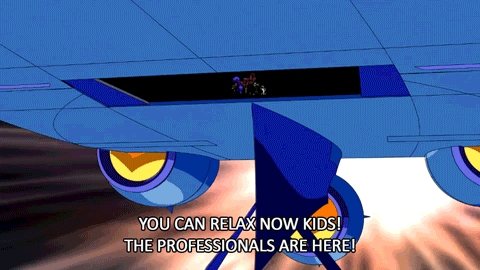
Their leader tells Wave to distract it and Esper to ready a mind blast. As soon as Esper does her part, the others go in, making the squid let the ships and other captives go.
When Superman tries to help, he nearly gets hit by one of the weapons used by one of the other team.


But when Lightning Lad manages to help, he’s thanked.
Esper delivers another psychic attack, and when the Legion goes to attack, this happens.

That is disgusting. RIP Space Squid.

Aww, Sparky doesn’t want his nerd teammate to embarrass him in front of the cool kids.
Still Superman goes over to thank them.
The leader says that they can clean up the mess. To which Superman goes “Oh! Right!” Gosh what a boy scout.
Later, we see that Colossal Boy has departed the rest of the team, and Superman thanks him for helping earlier. Although Lightning Lad comments they looked like dumb kids during the mission. What a sour puss.
However Bouncy questions who the others were.

However, Lightning Lad’s thoughts clearly contrast Triplicate Girls’ thoughts.



I love how the girls are all gathered together. It’s like they started a poly-relationship.
Actually, can the whole legion be poly-romantic? That takes a lot of trouble out of shipping.
Of course, Lightning Lad goes straight into Tsudere denial mode.
When Saturn Girl says they’ll see soon on Lightning Lad’s fan-crush on the other group, he angrily asks if she’s now clairvoyant. She answers she just has good eyes, as she noticed their ship at the Dinner the Legion was just heading to.
My observant queen.
How are Jupiter burgers different from other burgers? TELL MEEEE
While the rest of the group is enjoying the meal, Lightning Lad is is clearly pining to talk to the other team. Saturn Girl tells him in a slightly annoyed tone to just go over an talk.

Superman is adorable when eating his burger. Look at how happy he is. He deserves to be happy.


Now the beginning of this next scene is actually capable of giving me second hand embarrassment. I dunno why, it just does. Maybe the expectation Lighting Lad is about to goof this up somehow?
While it seems like at first the other group has no interest in him at all, the leader does talk to him just as he’s getting ready to go, telling him he did a good job earlier. He then introduces himself as Tyr, and the others besides Wave and Esper are Hunter and RonKar, and says they are the Light Speed Vanguard.

WHAT A DORK
He’s so star-struck he has to be reminded to introduce himself.

And then Hunter comments he seems a little old for the other Legionnaires.
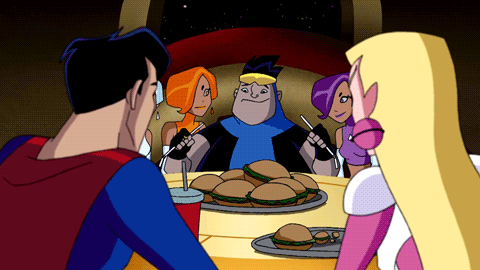
Bouncy I love u.
But a moment for Lighting Lad’s face at this.
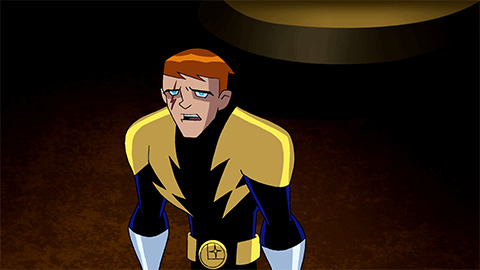
OMG WHAT A LOSER
Regardless, the LSV give him their card.
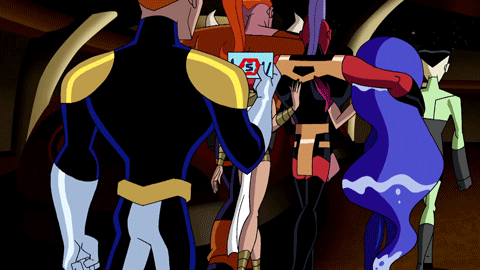

What a happy fanboy.
But then returning to HQ, we see that the place is filled with people who don’t seem to be regulars at the place. Making Lighting Lad ask Brainy on what’s going on.
Who answers that a recent memo said Bouncing Boy is holding seminars for people who will be auditioning soon.


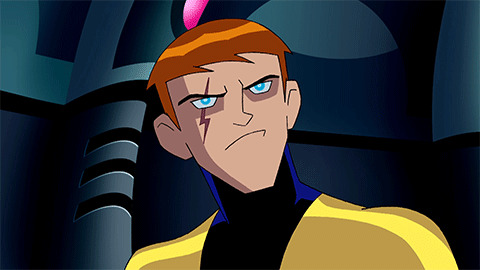
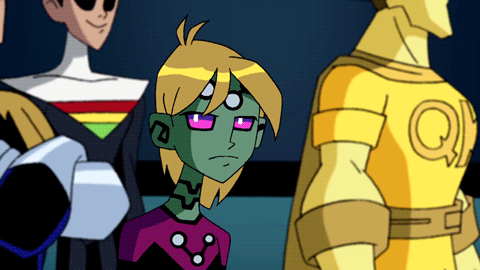
Aww my nerd son attempted a joke. Too bad it wasn’t received very well.
But turns out Lightning Lad has his own fanboy! Peter aka Porcupine Pete!
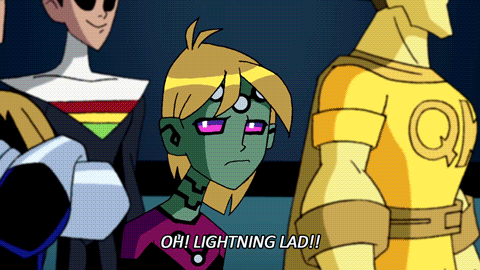
He attempts to demonstrate his powers, but it doesn’t go smoothly.

Da booty tho.
Peter apologizes, but Lighting Lad still walks off.
Rude, you go back and spend time with your fanboy.
Afterwards, Lightning Lad is seen alone and the card given to hip appears to be able to make a portal. Which he walks into with no questions.
Wow what if that turned out to be a death trap?
But the design of the place he walks into is pretty cool to look at.
But I think there’s something even better to look at.

THAT’S RIGHT
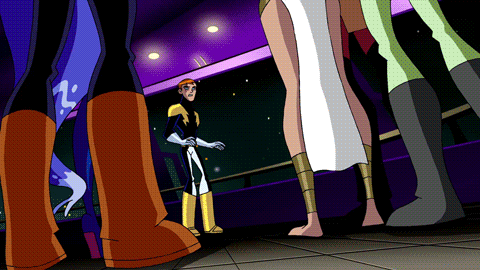
HE’S BACK
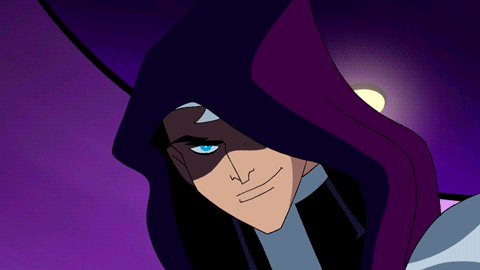
OUR TRASH LORD
OKAY THE FACT THAT HE’S THERE IS PLENTY OF REASON TO SUSPECT SOMETHING IS WRONG.


Nice call back to Champions, and a nice reminder Lighting Lad does not have many positive feelings towards Mekt right now.
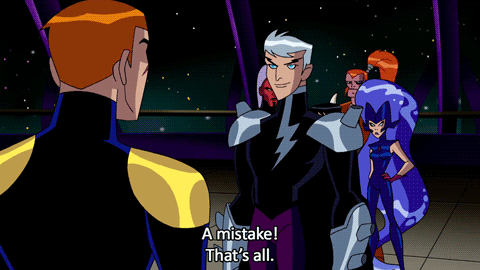
Honey, it was a bit more than just a mistake.
When he claims to have moved on to better things, Lighting Lad’s brain clicks and he asks if he’s really with the LSV. Again, another bad sign.
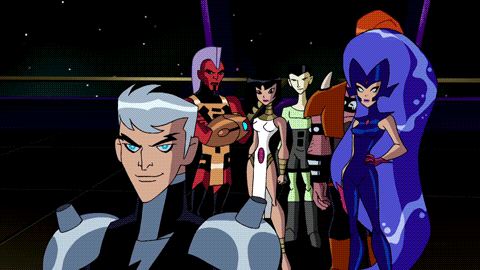

Lightning Lad, he has been constantly on a more positive side of a relationship than you. This really isn’t that surprising.
But aww, sweet older brother. Saying he’s perfect
When Lighting Lad says he’s already in the Legion, Mekt says the Legion is for kids.
Back on the trash baby list.
However, Tyr tells Lightning Lad to hang for a while before making any decisions. And then Lightning Lad calls up the Legion.
Bouncy seems horrified Lightning Lad might be leaving, especially since he helped start the Legion.

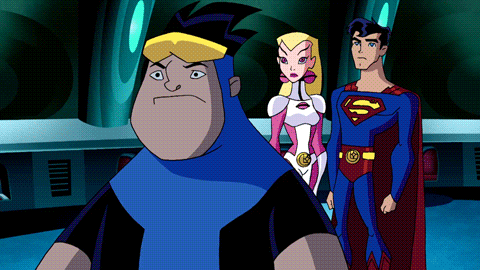
That’s one reason?
When Lightning Lad hangs up, Saturn Girl tells the others that she has a bad feeling about the LSV, admitting that she tried to read their minds. However she held back on telling the others earlier because of feeling guilty, since she tries to reads minds only when she is given permission (or if the situation is very serious). But she couldn’t get through because Esper was shielding them.
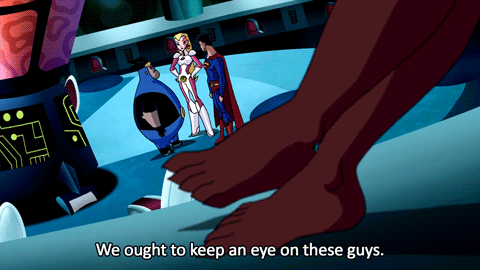

PUPPY WANTS TO STAKE OUT.
Also, when I first saw this episode, I thought he said “steak out”, which made no sense to me but I found kinda funny since he’s part-carnivor.
Switching back to the LSV, Mekt is talking to Lightning Lad, saying it’s just like old times, which Lightning Lad agrees to.
And then Esper goes ahead and reads Lightning Lad’s mind. Major red flag.

OH **** YOU AGAIN

TINY CHILDREN
... and backgrounds with details but are too dark...
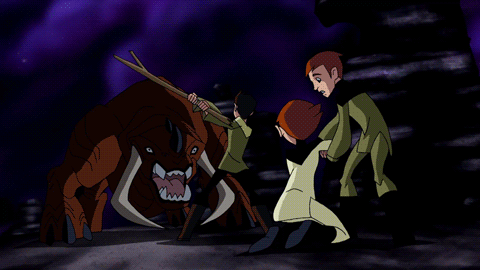
AAAAAAAH
When Esper finishes, Tyr tells her to give LL privacy. When he realizes she was just reading his mind, Sparky is not happy.
Outside the LSV’s ship, Timber Wolf and Superman are staking them out, with the cruiser cloaked. No sign of takeout though. Probably haven’t been waiting that long.
However, I guess either checkers is either a lost game in the 31st century, or Timber Wolf has never really played any games. Given he questions Superman on what checkers is when waiting.
And then questions what Kansas is. Which is a bit more on an alarming side.
However, they don’t have to kill time as LSV gets a move on, heading to a transport that’s being attacked by Sand Raiders.
And the LSV seem to have a good handle on the situation.

Dat eyeliner.
However, the raiders start to pull out… to get the big guns out.
Tyr suggests Lighting Lad to take care of it by himself, and he goes off to do so. Oh trash baby.
He gets knocked down, but then Superman and Timber Wolf intervene. Lightning Lad is not happy about it.
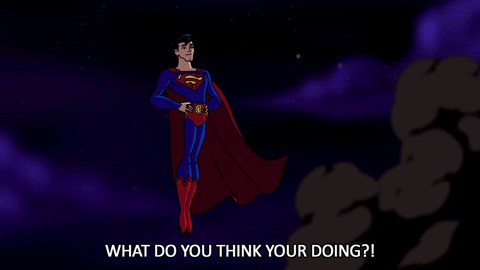
What a loser.
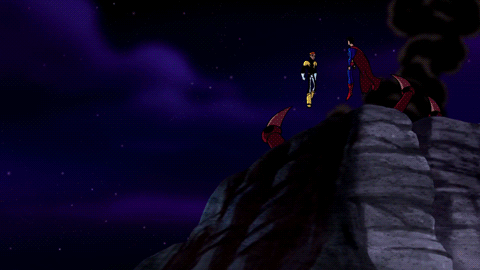
Big brother behavior~
And we get some glorious interaction between Superman and Mekt
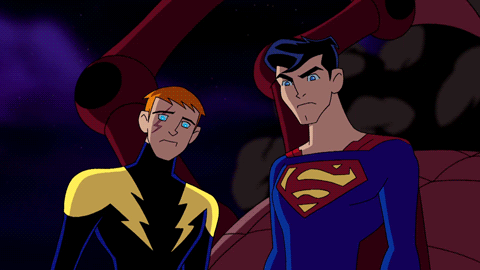
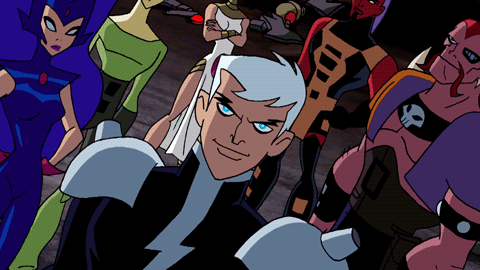


Mm, the Superman we had in the first episode would be a little more inclined to believing people can change.
When the LSV start walking off, Lightning Lad asks what Superman and TimberWolf are doing in the same place. Although Superman is 100% honest, Lighting Lad still tells them to leave. Prick.
Superman then leaves, commenting that Mekt was right on people changing.
Oof. Not a good thing to get salt from Superman.
However, before the LSV leaves, they bill the guys they just saved. Who are taking decontamination stuff to a colony, and it sounds urgent.
This puts the LSV in a new light for Lightning Lad.
Especially when Tyr tells him “Whoever said we were heroes? This is business.”
Oof. Not what the trash baby needs.
When Lightning Lad tries to get the LSV to go help out at several places, Mekt turns him down, saying there’s no credit.
But all I could focus on is Dem Legs.

UNF
Also, bonus points for having him examine his nails. He might be considering gloves like his brother now.
However the brothers are interrupted by Tyr, saying the captain of the transport is refusing to pay. And says it’s time to collect.
Finally returning to the Legion HQ, Bouncy is talking to the try-outies, getting them ready. I love him.
However, when demonstrating with one of the applicants, Breath Boy – who can hold his breath for an extended period of time – Superman calls him because they got a distress call.
Upon arriving to the transport with the decontamination units, the Legion sees the LSV ship.
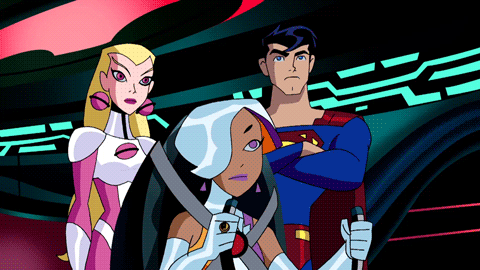
But Saturn Girl quickly finds out what’s going on.
Inside, the LSV are taking the decontamination units. Wow. What pricks.
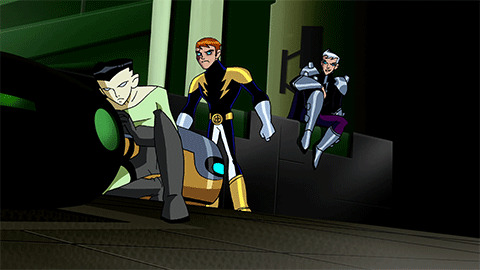
But dem legs tho. And the way he’s sitting is proof of Mekt being a cat.
Tyr tells Lightning Lad to take care of the captain, but Sparky’s conscious wins out.
Mekt tries to get Lightning Lad to calm down, but Lightning Lad is having none of it.
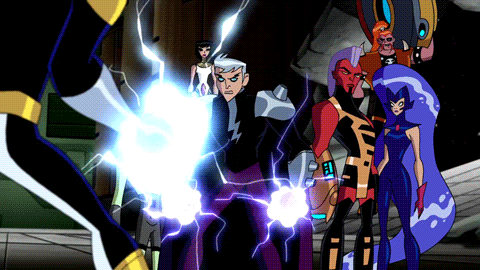


Triplicate Girl outside comments she can’t believe Lightning Lad got mixed up with hijackers, just when Lightning Lad is knocked out of the transport.
Superman goes out to catch him, holding him bridal style.
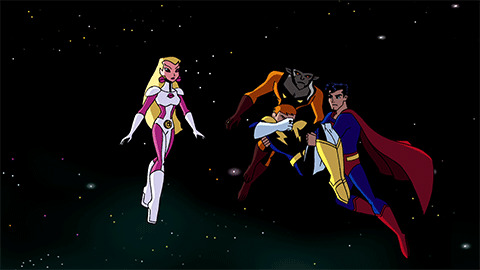
Good thing Brainy wasn’t there.
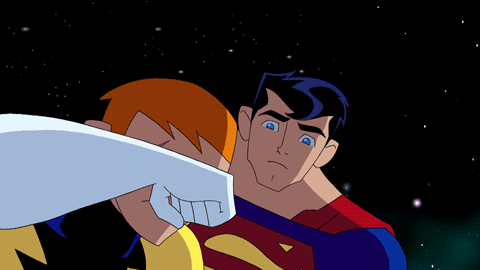
Wow he can admit that.

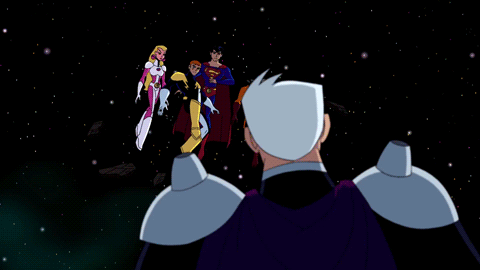
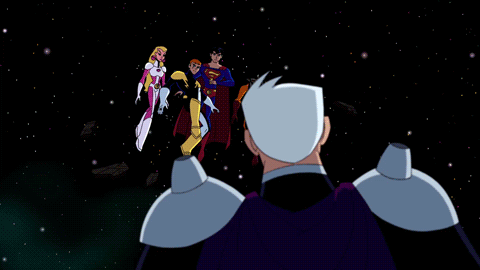


So, judging from what Lightning Lad said, there was still some hope holding out that his brother CAN do something good, and a long time ago, did look up to him. Oof. This hurts me.
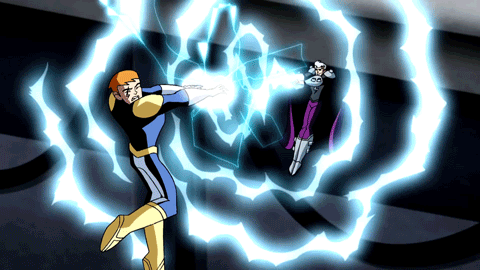

AND WE GET A CONFIRMATION ON WHERE THE POWERS CAME FROM

While the brothers have a go at each other, Hunter throws flares at Superman and Saturn Girl, who are both saved by our beloved Puppy, who then lunges at Hunter. While Superman takes Tyr on and Saturn Girl fights Esper, after being attacked by a mind blast.
Back with the brothers.


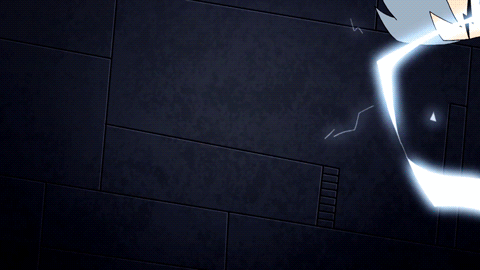
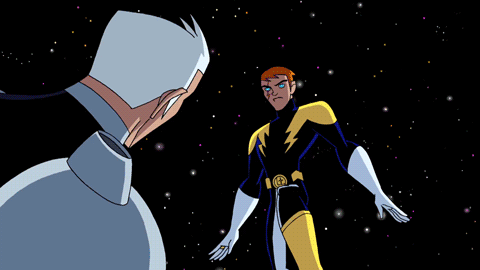
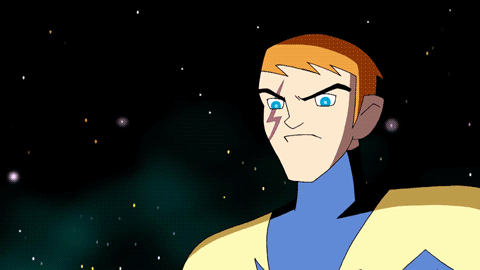
I don’t think that face implies anything good.

At what point are we talking about? Recently? Past? AAAAA
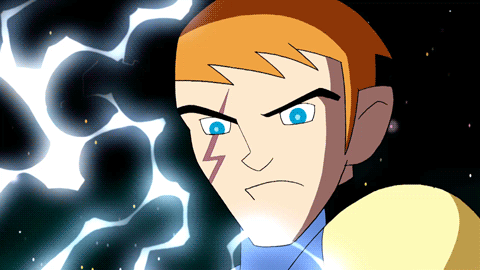
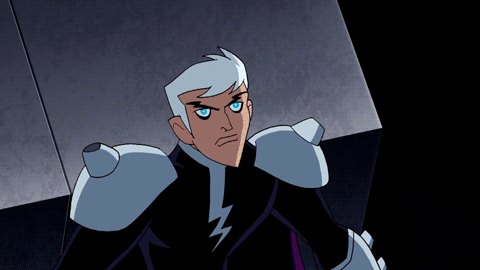
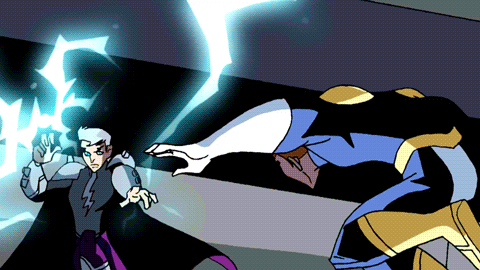
Like the touch of Bouncy watching the fight before switching channels and seeing the LSV ship coming head on.

While Wave and Ron Karr fire a few shots at the cruiser, turns out Bouncy has a lot of tricks up his sleeves.

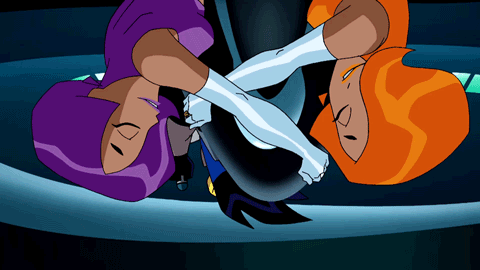

Aww, poor white TG
Meanwhile, SG tries helping TW but gets ambushed by Esper. However, she manages to catch esper off guard and knocks her out.
Timber Wolf starts to get cornered by Hunter, but Saturn Girl manages to turn the table with making Hunter see Glorgs, which I assume are the equivalent of Furbies.

What a pure friendship.
Superman and Tyr seem pretty even in strength, and when both are starting to wear down. However, when Tyr takes out a gun-like weapon (it does not look 100% like a gun, so im refraining from calling it that) Superman uses his heat vision to blow it up, causing a smoke screen and then proceeds to beat him.
With the Ships’ fight, the Legion manages to sneak up on the LSV.
But back to the brothers.
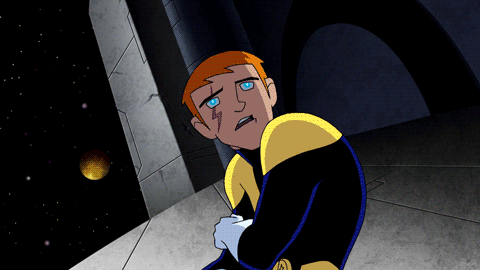



Oof. They were really going for it.
But a moment to appreciate one of the frames of Mekt.
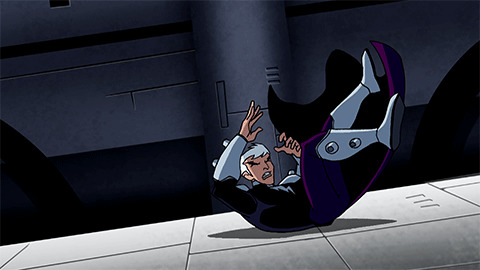
Edited to show the best part better.
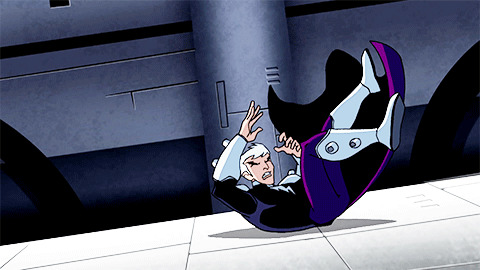
ASS


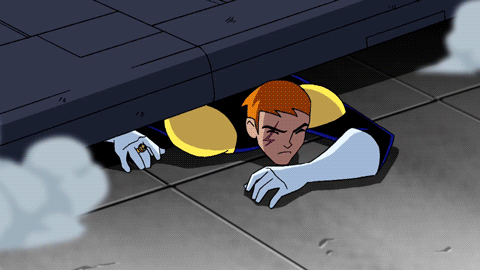
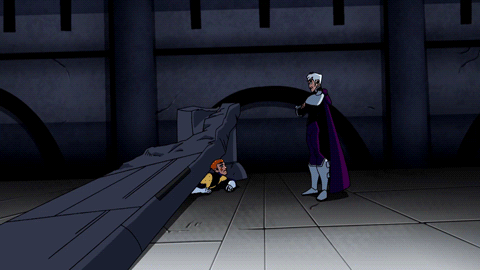
Okay, how heavy was that metal thing?

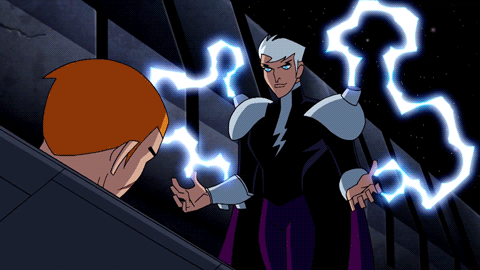
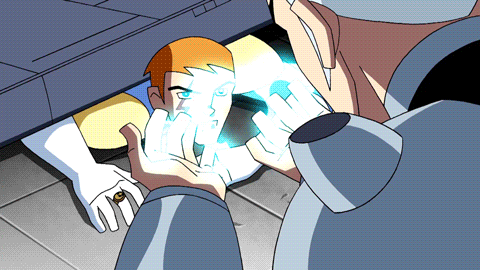
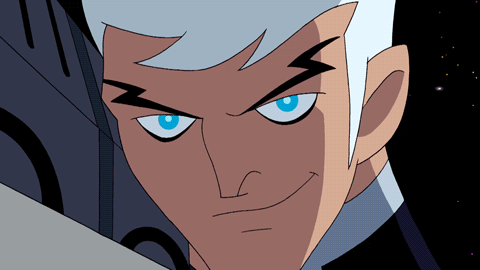
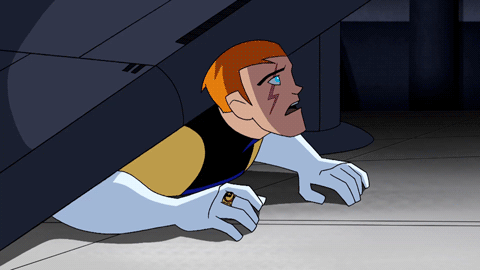
As soon as Mekt is gone, Superman comes to help Lightning Lad get the metal thing off, saying they have a delivery to make.
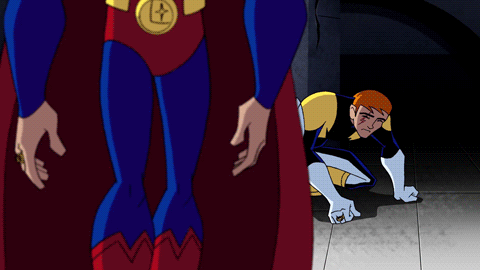


Take this out of context and it looks like two boyfriends getting back together.
After seeing the rest of the LSV tied up, we go to the ship, where Triplicate Girl is gushing about Bouncy during the fight, to which Superman says they make a good team.
Giving us the first hint at BB/TG

Awwwww~
However, Lightning Lad isn’t doing to well and Saturn Girl goes to talk to him, giving us a good moment between them.
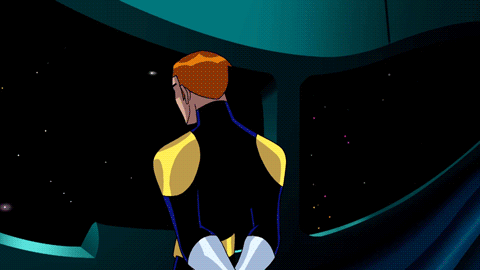

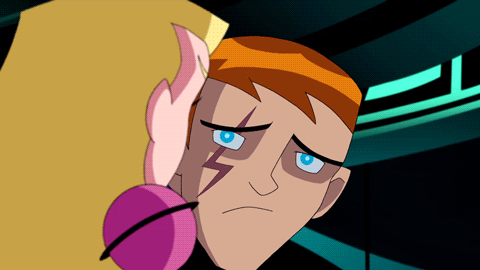
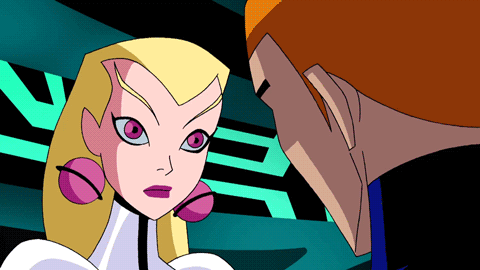
After that incredibly touching moment, we see there’s still one applicant in the HQ, even after closing hours. Then we exit out the episode.
So final thoughts on the episode overall and the character
Well, obviously I love it because of my Trash Lord. But don’t worry, I’ll gush on him towards the end of this section.
This episode does have its plus and minuses, both of which I will discuss.
In terms of world building, we now know some places are still being colonized in Space, given the guy who is delivering the decontamination units mentions colonies. Honestly, knowing there are still places left unexplored is pretty cool for me as it invites multiple possibilities with different places and beings.
We get far more character development than last episode. In terms of discussing the characters, I’m saving the brothers for last because it’s that good.
Superman is once again not the central character of this episode. But we see that he does have doubts about some people doing good.
Let’s go over a list of people he trusted in the show.
Dr. Londo. Who turned out to be abusive and manipulative.
Alexis. Who tried to kill his friends.
Zyx. Who proved to be very dangerous.
But when Mekt says he’s with the LSV, he is immediately suspicious. Now there is the fact Saturn Girl said that they were up to something, but given everything that has happened, this is a big sign of change in his trust in others. And that he needs a vacation.
And he makes a jab at Lighting Lad as well when it seems Lightning Lad has switched sides. But, he easily goes out to save him when he gets blasted. Showing he still trust Lighting Lad to do what’s right.
We finally get more development with Saturn Girl in this episode. We see once again she’s incredibly observant of people, and doesn’t need to read minds to figure out what people feel or think a fair amount of the time, but does teases Lightning Lad when he’s being tsundere as hell. We also see she knows there are lines not to cross regarding privacy of others’ thoughts. But she can still cave to the temptation of reading others minds without permission, and she held back information because she felt bad about doing it. Yes, give her flaws. Make her more realistic.
But we also see more of the comforting side of her again that she had shown Superman and Timberwolf, but this time to Lightning Lad. Nice to see.
Bouncing Boy is an absolute JOY. He’s so nice to the hopeful applicants for the auditions, even though everyone else seems to have doubts about most of them.
While at the diner, we see a love of food , and I I can relate. Immediately. I am on the heavy side, and was much heavier when younger. And he’s not constantly eating, unlike some other portrayals of fat people I have seen. Heck, we’ve only seen him eat three times before. The fair, at Clark’s home, and the popcorn while watching a movie. He does get food in Q12, but he doesn’t eat that because eyeballs. He is more than just his love of food.
A fat person being portrayed positively is something I enjoy to see. Hence one reason why I love Steven Universe, which has several fat/heavy characters. Plus seeing him goof around is fun to watch as well
And we see he’s very good at maneuvering the ship, most of it being improvisation.
Which makes something in episode 2 make more sense. Him taking offense on B5 insisting on him to use a system to help fly it. He is very good at piloting, so with Brainy trying to make him use a console, it does seem like an insult to his skills.
Timber Wolf returns, but unlike Phantoms, he seems to be coping much better with being with the Legion. The people in this episode he seems to automatically trust are Saturn Girl – unquestionable because she was the one who helped him first, and Superman. And we see that his relationship with Saturn Girl has developed from the second episode, but not in a romantic sense, which is rare to see, outside brother and sister relationships. It’s platonic. Which is so good.
But then there’s the “What’s Checkers?” moment and “What’s Kansas?”. Now this seemed funny to me as a kid, but now, it’s worrisome as hell. We still don’t know if Timber Wolf spent his entire childhood with his father. If he did, then those two questions imply a lack of education on certain things. Things that can be considered trivial in the 31st century. Which further implies his father isolating him from the outside world.
But it is possible that Kansas and Checkers are things that are just not common knowledge to most people in the 31st century. We’ll get more insight into Timber Wolf’s past next episode and in the second season, but still, things to worry about.
And we FINALLY get development with Triplicate Girl. Which the lack of in the last episode she was in was a major let down. And the three parts of her aren’t all the same, the vary in their behaviors, as evident when White throws up from motion sickness. And the fact they don’t go back into one being after the fight means she’s comfortable being split up.
She’s like a reverse Garnet.
She is the all-together version of the three duplicates of her, but the whole version is the original version. While Garnet is the sum of two people, Sapphire and Ruby who were their own persons before fusing. But Triplicate Girl is comfortable with splitting her three personas up, and equally as comfortable with becoming one again. Garnet always wants to be fused. Ruby and Sapphire love each other so much. And both choices are perfectly fine. As long as they are comfortable about it and do so in a healthy manner, anyway.
They immediately saw the LSV as stuck-ups, which is not too far from their true nature. And their expressions the three of her when Saturn Girl began teasing Lightning Lad? They were ready to join in on the teasing. Plus we see her as the copilot(s) of the Legion Cruiser, and going on how amazing Bouncing Boy was with his maneuvers. Perhaps Bouncy can teach her a few things?
Wished that we could have seen more varying behavior between the three personas, but thankfully, the comic the show got did.
We saw Brainy, but he didn’t do much this episode, and we don’t even see him that long. Now in the original airing order of this episodes, this wouldn’t stand out. But knowing what happens in the next episode in the production order, it gives us a different picture. Which we will discuss in the next episode review to avoid spoiling.
But we see that now he’s attempting to make jokes, although he’s not that great at it. Just keep practicing, baby.
We also get our first non-regular legionnaire appearance on a mission. I really wished we had more like this. I love having many characters that vary. The guest character we got was Colossal Boy. Like Brainy, nothing much to say on him. Sadly.
But then we have Porcupine Pete, aka Peter. He has an appearance shorter than both of the two characters I just mentioned, but the writers managed to give him personality in that short amount of time. We see he looks up to Lightning Lad and is a huge fanboy, possibly rivaling Brainy’s own crush. And he can confront the object of his affections. But Pete messes up on his attempt to impress him. Real bad. And you can’t help but feel sorry for him.
Lightning Lad doesn’t deserve him.
And for our villains. The LSV makes far more interesting villains than the F5. The LSV manages to have more than one girl on the team, but we don’t see much interaction between them, unlike the Legion.
The least developed of the LSV is sadly Wave, one of the two women on the team. She never speaks in this episode. We see her laughing with the others at the diner, but that’s it in verbal communication, and we can’t tell if it’s her own laughter being heard. But we do see her motioning to Ron Karr with her hair when they were about to attack the Legion Cruiser. This does leave room for the people watching to speculate.
Maybe she can’t talk at all. If so, then the staff could have taken advantage of this. How? Let’s look at Sandman from ROTG.
Sandy can’t talk, but he uses his sands to do charades. Wave could have done something similar with her hair. That would have been amazing to watch.
Hunter has an accent, which I think is based off an Australian one, but I’m not reliable in distinguishing accents. He also seems to be the oldest, and has experienced with using different weapons. He also has experience fighting fauna from different places in space, as we hear him talking about fighting another space squid elsewhere. Putting the fight with Timber Wolf in an interesting perspective. Nothing else to add.
Then we have Ron Karr, who shares the same voice actor as Timber Wolf, Shawn Harrison. His power in the comics was originally flattening his body, however in the show he is a shapeshifter. I guess the original source’s power can be considered shape shifting to an extent, but I can see how this change can bother the comic fans.
Another power change of a comic character that comes to mind is Negasonic Teenage Warhead, also known as Ellie Phimister.

Originally, her power is telepathy and precognition. However, in the Deadpool movie, her powers have been massively changed to better suit her name. In the deleted scene, when she teases Deadpool, we do get a slight nod to her original power as she tells him she can predict the future.
I thought that the film handled her very well, including the power change. But that’s just my opinion.
I’m not sure why the staffdecided to change Ron Karr’s power. Unless they already were planning season 2, where he plays a more prominent role. Or they just wanted to do more with him, because flattening himself doesn’t let them do much.
Talking about his powers aside, he also pilots the LSV ship, but still gets owned by Bouncy’s skills. I can’t tell what age he is, although for the longest time I figured he was the youngest. Now I’m not sure.
Moving on, there is Esper, the second female member of the LSV.
It is clear she is the foil to Saturn Girl. Esper does not have any respect for privacy. Which is very alarming. She just went ahead and read Lightning Lad’s mind. And didn’t feel guilt afterwards. It’s unlikely she draws the line on when not to use her powers on others without permission. Esper does not think about another person’s consent. That makes her a very dangerous person. Even if she is supposed to be on the same team. And she does not offer the same comfort Saturn Girl does.
One thing I need to get off my chest however with her is her outfit. It is very obviously Egyptian-based. And she does not seem Egyptian. As I mentioned last time, I’m not Egyptian-descent, but this still bothers me. Much more than last time given that it’s far more obvious than the Head of the Council of Zerok (I found out that’s the proper spelling from the story boards).
… And as I’m writing this, the reboot of The Mummy is coming out in theaters.
*painfully heaves in the corner*
But most of the character designers of this episode are not white people (after doing a lot of searching on the names in credits). And Triplicate Girl herself was intended to have darker skin, but her skin was lightened in the final products, sadly. So, could Esper have had a less-white appearance in early product, and only her outfit was spared in post-production? Perhaps.
We won’t know what went down unless someone asks one of the people who was involved with development for this show.
Oh, and if you are looking for an alternative movie to “The Mummy” reboot film, or you saw it and you need treatment to recover from that, I have the perfect solution/treatment.
1999′s The Mummy.
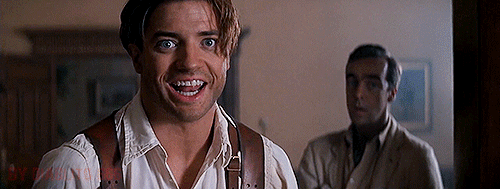
Now to talk about Tyr.
He’s a smooth talker. Very good at convincing Lightning Lad to come and stay. Which is not easy, given his ego, and dislike for his brother. He seems like a natural leader. And I like his design too.
But my favorite thing about him is his voice actor.
Not sure on who he is? Here’s a little hint.
youtube
THAT’S RIGHT. HIS VOICE ACTOR IS KHARY PAYTON, THE SAME PERSON WHO DID CYBORG FROM TEEN TITANS.
KHARY’S CYBORG IS ONE OF THE MOST ENJOYABLE CHARACTERS OF ALL TIME. SO KNOWING THAT HE WORKED ON THIS SHOW EVEN A LITTLE BIT BRINGS A LOT OF JOY TO ME.
However, the ultimate downside is that Tyr is nowhere near as expressive as Cyborg, voice acting included. They are different characters, but one of the things that made Khary’s Cyborg enjoyable is the ablility to flex between joyful Boo-Yahs and very serious dialogue. We know he has the talent. But it’s not used to its full extent.
With that said, this does remind me one of the show’s biggest weakness. The ultimate comparison to Teen Titans’ original run.
Teen Titans had more development with its characters, more expressive animation, and a longer run that Legion of SuperHeroes. When Teen Titans finished season 5, many people were looking for a substitute. And given that LOSH is another DC comics, the comparison was going to happen. That’s something that the staff had to be aware of during production.
Good news is that now, we can say that LOSH is better than the current Teen Titans Go.
And now, our favorite brothers in this show.
If you want an image to sum up their fight in simple terms, here.

But to delve into more detail, we’ll first look at Lightning Lad.
So this is the first time we see him having idols to look up at, and does seem embarrassed by the Legion’s far more childish approaches to things. Even though he can also be childish at times. And we see his more aggressive/jerk side again, more than usual, matching the first episode’s personality again. The best examples are when he’s with Porcupine Pete – walking off is not a good way to console a fan, and when he tells Superman and Timber Wolf to leave him alone.
Does that mean he’s regressed in character development? No. His jerk personality was never fully addressed in other episodes. His ego was in Champions though. Which is something else entirely.
He does apologize to Saturn Girl for his behavior towards his teammates at the end though, and did seem to be expecting consequences of some sort for being with the LSV and how he told Superman to go.
He was very lucky Superman and Saturn Girl were ready to forgive him. However, I won’t be surprised if the others make him do some sort of re-initiation thing as punishment.
We also see he tends to have ideals on what heroes are like, neither of which the Legion or LSV live up to, for different reasons. But sees the LSV as far worse.
But we finally see part of the event that gave him his powers, and got a mention of it from Mekt.
The Lightning Beast attack. Which was him, his sister Ayla – who we finally see, and Mekt, being attacked by a creature far bigger than them, and was not friendly.
It was traumatic enough to turn Mekt’s hair white.
First thing to discuss is how deep that trauma affected him, regarding the previous episode.
Zyx messing with a large monster with powers, and was established previously that they are dangerous and will attack people. Sounds immediately familiar to Lightning Lad’s own story, doesn’t it?
And after they put Comet and Cupid back in their exhibit, Lighting Lad gets really mad. It wasn’t going to help the current situation then, but now that we know he’s seen that situation before, we can deduct something else.
He’s mad because it could have been a repeat of whatever happened back then. Making his reaction much more understandable.
At this point, we don’t know the full story of what happened though. Around this episode’s original air date, when I first watched it, I had looked Lighting Lad up on Wikipedia, and read more on the Lightning Beast attack, which gave all three siblings their powers. And found out that Lightning Lad’s sister, Ayla, who was also a legionnaire in the comics.
Which now begs the question – where is she in the show?
When I first watched this and did research, I figured she was simply not shown yet, or probably had not yet joined the legion, and was still living at home.
But now, it seems a bit more obvious that wasn’t simply the case. Neither brothers mention her at any point in this episode or Champions. Implying whatever situation she’s in, it wasn’t easy for them to talk about.
Back to Lightning Lad.
Regarding the relationship with his brother… it takes an unfortunate turn for the worse.
He clearly doesn’t trust Mekt when he first sees him in this episode, regarding the incident in Champions. And doesn’t see him as a very generous person. It doesn’t stop him from staying with the LSV though. And we see during the fight with the sand raiders, he still cares enough to help Mekt. And does admit he held out some hope that he would do something right, but that hope has ceased.
But during the final fight, it seems like whatever positive feelings has been cast aside. And expects Mekt to take advantage and deliver the final blow. But his expression when Mekt leaves suggest he’s saddened by the turn the relationship has gone.
Oof.
And now for our favorite piece of trash.
First thing. Get rid of the purple pants, Mekt. They don’t look good on you. Everything else of his costume is good though. And eyeliner is on point, and Dem Legs are as fine as ever.
And I like the touch of detail in parts of the episode where his lightning was a slightly different color from Lightning Lad’s. Sadly this detail is not kept consistent in the episode.
And now his role as a villain. Perfect. I completely can see him as a villain in this episode. And I certainly did when I first watched this. Hence making me dislike him.
In the original comics, Mekt was the leader of the LSV, called Lightning Lord, but no one calls him that, and Tyr seems to be the leader. Not sure why the change, but maybe it has something to do with the self-esteem issues we saw in Champions?
We see his selfish side shine through as he’s part of the LSV for financial reasons. But he’s not portrayed as a typical greedy villain, thank god. He also shows his powers in use in this episode, which we did not see last time, implying he has figured out how to use them effectively against people.
Once again, he’s the more positive person of the brothers’ relationship, but even that seems to change at the end of this episode.
He’s the one who wants Lightning Lad to join the team the most. Even calls him perfect for it. And when they are on the ship together, Mekt calls it like old times, and when we get a closer look at them, right when Esper is about to read Lightning Lad’s mind, he’s smiling.
He didn’t offer Lightning Lad a spot for any manipulative reasons. He genuinely wants his brother there just to spend time together.
When Lightning Lad refuses to help steal the decontamination units, Mekt tries to talk to him. Although it doesn’t work. Mekt gets mad and charges up to zap him, but then lowers his fist for a bit.
He zaps him a few moments later though.
During the fight, he comments he got more power from the Lightning Beast. How does he know that? I WANT DETAILS!
But I want to discuss a moment during the fight that stood out to me. When Lightning Lad is starting to corner him and seemed ready to deliver some serious blows, Mekt says something that I’m really curious about.
“Wait! I saved your life! Isn’t that worth something?”
At what point of time is he talking about? The Lightning Beast attack? He is shown trying to beat it with a stick to give Ayla and Garth time to run. But that happened so long ago, it wouldn’t make sense to bring it up at this point.
He doesn’t do anything in Champions to save him. And nothing in the fight against the sand raiders.
That leaves us with one other option.
Remember that when Lightning Lad turns on the LSV, he doesn’t zap Mekt, giving him no reason to zap his brother.
Except Lightning Lad zapped Tyr, who immediately tells him “You’re gonna wish you hadn’t done that.” So… shouldn’t Tyr been the one to hit him instead of Mekt?
Putting Mekt’s statement and the situation together paints us a new image.
Tyr has no emotional connections to Lightning Lad. He’s chill with having him on board, but isn’t desperate to keep him.
Tyr was possibly going to do something to Lightning Lad that would have been fatal, but Mekt intervened. Yeah, Lightning Lad got blasted out of the transport, but relatively speaking, he was unharmed.
This serves as more evidence Mekt does legitimately care for his brother.
But Lightning Lad states he doesn’t owe him for that. This is also a good point. Just because a person does something good, it doesn’t mean you automatically owe them.
But at the end of the fight, he’s overpowering Garth. All on his own ability.
Calling back to Champions now, remember he resorted to making a deal with the F5 in disguise to get first place. He bested Lightning Lad via cheating then.
But now, he’s not pulling any dirty tricks, and he still comes out on top. He’s coming in first, all on his own.
That is probably like getting high for him.
AND HE LOVES IT.
Which is toxic for their relationship, decreasing the positivity he had for it.
His remark towards Lightning Lad when asked what he’s waiting for when his brother is vulnerable is that he likes it better when he owes him, but warns him if he gets in his way again.
I know Lightning Lad at this point won’t hesitate if he must do something fatal to Mekt, even if somewhere deep in his heart he still wants to love him, and expects Mekt to be the same in regards of a fight. But it’s not as clear on Mekt’s end. He leaves a threat hanging over Lightning Lad’s head, but he had the chance to kill him.
So while he’s not as positive on the relationship in the end as he was in the beginning, he’s still the more positive one than Lightning Lad.
That’s all for now, but for the next episode, I fully intend to stream it on my twitch channel. Haven’t decided on exact date or time yet. Will let you guys know eventually
In the meantime, I’m just going to be curled up in a ball while I cry about these two brothers.
35 notes
·
View notes
Text
What Would Be the Best Universal Language? (Earth 2.0 Series)
Around 7,000 languages are spoken on Earth 1.0. (Photo: Quinn Dombrowski/Flickr)
Our latest Freakonomics Radio episode is called “What Would Be the Best Universal Language? (Earth 2.0 Series).” (You can subscribe to the podcast at Apple Podcasts or elsewhere, get the RSS feed, or listen via the media player above.)
We explore votes for English, Indonesian, and … Esperanto! The search for a common language goes back millennia, but so much still gets lost in translation. Will technology finally solve that?
Below is a transcript of the episode, modified for your reading pleasure. For more information on the people and ideas in the episode, see the links at the bottom of this post.
* * *
In our previous episode, we talked about living under the ancient curse of the Tower of Babel.
Esther SCHOR: The curse of Babel is an existential condition in which we live every day. We use language to communicate, but we cannot rely on it to make ourselves understood.
We can’t always rely on it because …
John McWHORTER: Well, we have 7,000 languages.
Seven thousand languages? We learned about the many costs associated with this linguistic diversity — financial costs, psychic costs, even war:
Shlomo WEBER: Many people died in the war, which, in fact, easily could have been avoided.
And we learned that linguistic diversity has plenty of benefits too:
Lera BORODITSKY: There are certainly claims about types of thinking that become very hard without language — or become unlikely without language.
Those are some of the things we know about language here on Earth 1.0. But today’s episode is part of our Earth 2.0 series, in which we imagine we could reboot the planet and do some optimizing — or at least some tidying up. So, if we were starting over …
Maria Luisa MACIEIRA [French]: Si on devait tout recommencer à zéro…
Kew PARK [Korean]: … t시 시작한다면…
Isabela CABRAL [Brazilian Portuguese]: Se fossemos começar de novo …
Dhari ALJUTAILI [Arabic]:… أحسن طريقة لكل الناس على الأرض انهم…
CABRAL [Brazilian Portuguese]: para todos na Terra se comunicarem uns com os outros?
PARK [Korean]: 가장 좋은 방법은 무엇일까요?
… what would be the best way for everyone on Earth to be able to communicate with one another?
* * *
In the future, human-to-human communication may be so different that it’ll render our mission today moot. Between auto-translation and artificial intelligence and maybe even mind-melding, will anything ever get lost in translation? Maybe; maybe not. But — that’s the future. Let’s talk about language on Earth 2.0 using the tools and knowledge at our disposal today. If we could start from scratch, what would that look like?
Michael GORDIN: If we did this from scratch it would be a very surprising outcome.
That’s Michael Gordin, a historian of science at Princeton.
GORDIN: And who knows how it would work without the path dependency of previous empires, current economic structures, our current modes of transportation and media and communication? It would be very interesting to see how that would shake out.
Okay, let’s start with a couple basic questions. Number one: should we consider — please don’t throw things at me — should we consider having one common language?
BORODITSKY: I would be wary of thinking of common language as the solution to perfect communication …
Lera Boroditsky is a cognitive scientist at the University of California, San Diego.
BORODITSKY: … because we already have [a] common language and that doesn’t lead to perfect communication.
McWHORTER: You would need oddly a language that had a lot less in it than many people would expect.
John McWhorter is a linguist at Columbia; he’s also an author and host of the Lexicon Valley podcast.
McWHORTER: You want it to be something that’s maximally easy for all of the world’s language speakers to use. You could have a universal language where tense was largely left to context, as it is in a great many of the world’s normal languages. You certainly wouldn’t have anything like grammatical gender. The vocabulary could be quite rich. That would be fun, but the grammar would be something where you could pick it up in a week.
Stephen J. DUBNER: I’m curious to know the degree to which language generally is utilitarian, like, “I want to pick up that thing,” or transactional, “I want that thing from you.” or romantic, or relationship, or gossip, or lying, and so on. And I’m just curious how a linguist might think about that.
McWHORTER: Language is more than questions, commands, and certainly more than just naked statements. Real language is about communication and charting feelings, telling people new things and that means that a language is a whole lot more than just nouns, verbs, and adjectives. If somebody says, “Oh, she’s totally going to call you,” that “totally” means, “you and I both know that other people think she isn’t going to call, but we have reason to think that she is.” We are full of things like that.
Okay, this leads to question number two: if there were a universal language, should it be a pre-existing one, or an invented one? English, while hardly universal, has of course become a very powerful language.
McWHORTER: What makes this regrettable to many, and quite understandably, is that English was the vehicle of a rapaciously imperial power and now America is the main driver.
So any pre-existing language will come with baggage, with lots of votes for and against. Does this mean we’d be better off inventing a new one? Apparently, some Facebook bots recently gave it a try.
CBS NEWS: According to several reports, Facebook’s artificial intelligence researchers had to shut down two chatbots after they developed a strange English shorthand.
A shorthand that its human creators couldn’t understand. As it happens, the dream of inventing a universal language has long been pursued by scholars, priests, even — as you’ll hear — by an ophthalmologist.
SCHOR: The history of language invention, which goes back millennia, has to do with reversing the curse of Babel.
Esther Schor is a professor of English at Princeton.
SCHOR: In other words, to return the world to a single language of perfect understanding. For some language inventors, this was imagined to be God’s own language and the language of divine truth.
In the 13th century, for instance, Ramon Llull, a Majorcan philosopher with Franciscan ties, sought to create the perfect language for channeling “the Truth,” and converting people to Christianity.
SCHOR: He created a formula for generating propositions from letters and words. He felt that some of them would be propositions to which an infidel would, of necessity, have to consent. But Llull’s truth was not the Truth, or at least it didn’t seem like the truth to the Saracens who eventually murdered him.
A few centuries later, the German philosopher Leibniz— an admirer of Llull’s, by the way — tried to build a language based on logic.
SCHOR: Leibniz’s idea was to represent propositions by numbers and he would reason by getting the ratio of one proposition to another and calculate an answer. Again, we have the idea of a language of logic without words.
And in the 19th century, a Jewish ophthalmologist named Ludovik Lazarus Zamenhof created a language both idealistic and pragmatic.
L. L. Zamenhof, or Doktoro Esperanto, invented Esperanto in 1887. (Photo: Wikimedia)
SCHOR: It’s called Esperanto because that was his pseudonym, Doktoro Esperanto, which means the hopeful one. He brags in this initial pamphlet that you can learn it in an afternoon and that it’s fun. So it was supposed to be easy to learn and easy to pronounce.
Esperanto was derived from various European roots. Zamenhof’s idea was not to have Esperanto displace other languages.
SCHOR: He called it a helping language or an auxiliary language. It would stand next to national languages and be a helping language to make bonds among people who were not like one another.
Zamenhof was a universalist …
SCHOR: But he was also a universalist who understood what it meant to have warm feelings for one’s people. Esperanto was to somehow reconcile those two things — to try to breed in us these feelings of attachment for other people who were really quite unlike us.
The larger goal of Esperanto was nothing less than world peace.
SCHOR: He knew that language could be a wall between ethnicities, but that it could also be a bridge. That was his motivation — to build a language that would be a bridge among ethnicities. He modeled it on the teaching of Hillel. “Do not unto others as you would not have them do unto you.” Hillel was a 1st-century rabbi, so it had a very Jewish cast to it.
This did not help Esperanto’s cause. As Esther Schor told us: “[A]nti-Semitism changed the fortunes of Esperanto when the French demanded that Zamenhof shear away its religious ideology.” Hitler and Stalin would also reject Esperanto. Regardless: if you remove its religious and utopian components, what’s left, Esther Schor says, is a language with some substantial benefits over many other languages, whether existing or invented.
SCHOR: What he wanted was maximal flexibility and simplicity. For one thing, the verbs are all regular in Esperanto. He wanted a language that was egalitarian and neutral. He didn’t want people to be disadvantaged because they weren’t a native speaker. He speaks very movingly about what it’s like to try to speak a language that’s not your own. He talks about his pulse racing and his palms sweating. It’s an experience I’ve had. Perhaps you have had it also.
Ruth KEVESS-COHEN: Esperanto is a lot easier to learn than other languages because it has very regular rules and very regular grammar.
That’s Ruth Kevess-Cohen. She helped develop an online Esperanto course for the language site Duolingo.
KEVESS-COHEN: You find that it’s taking you a lot less time than you thought to learn the language. Here’s a sentence in Esperanto. “Mi estas knabo” — “I am a boy.” There is no “a” in Esperanto. “Knabo” you can see is a noun because it has an ‘o’ at the end. Every noun ends in the letter ‘o,’ every adjective ends in the letter ‘a.’ Every verb in the present ends in ‘as,’ So you already know that “estas” is “am,” “are.” It’s the same. There’s no conjugation of that.
We spoke with Kevess-Cohen at this year’s Esperanto-USA National Congress — or Landa Kongreso, as you say it in Esperanto. Our producer Stephanie Tam spent a couple days there. You’ll hear about that in an upcoming special episode. You may be surprised to learn that Esperanto is still spoken. Esther Schor again:
SCHOR: These days, the most informed estimates I hear are several hundred thousand people speak Esperanto. The strength of Esperanto is not in numbers. The strength of Esperanto is in its continuity over 130 years in 62 countries, from generation to generation, without being passed down from generation to generation.
Still, for all its thoughtfulness and pragmatism, Esperanto never got anywhere close to its intended universal status — what Esperantists refer to as “La Fina Venko,” the “Final Victory.” Why not?
SCHOR: I can answer that by looking at what does look like a universal language in our world, which is English. What looked like a universal language in Zamenhof’s day was French. Both French and English were propelled into the world by commerce and armies, and Esperanto had neither of those.
GORDIN: In order to keep a language constant enough so that it can function as a global, universal language, the way English is functioning now, you need to have a global communications infrastructure that standardizes dialects and pronunciations.
Michael Gordin again.
GORDIN: You need to have a global entertainment industry that produces books with standard spelling, and a pattern of accents that are considered acceptable, or that mark different classes or regional identities, and that constant reinforcement requires an infrastructure.
It’s something we don’t think about — at least I’d never thought about it — but there’s a lot of upkeep associated with language.
GORDIN: When classical Chinese was being used as a lingua franca for a very broad region — it was used in Japan, Korea, and Vietnam as the language of written communication — a very strict civil-service exam system privileged learning the language to precision. That stabilized that language. To a certain extent the Anglophone entertainment publication and media industry, as well as the scientific institutions, stabilize a certain kind of global English now.
Gordin points to another factor that would make it hard to install a universal language: the nature of language itself.
GORDIN: The reason why I think you can’t just blanket install and say, “OK, everybody is going to learn Esperanto,” is because people will experiment and mess with the language. They’ll change it.
Which, by the way, is how we got to where we are today.
McWHORTER: Well, we have 7,000 languages.
John McWhorter, from Columbia.
McWHORTER: And language is inherently changeable not because change is swell but because as you use a language over time and you pass it on to new generations, brains tend to start hearing things slightly differently than they were produced and after a while, you start producing them that way. That is as inherent to language as it is inherent for clouds to change their shapes. It isn’t that that happens to some languages and not others. That’s how human speech goes.
DUBNER: All right, so imagine in our thought experiment now that we’ve got Earth 2.0. You’ve got seven, eight billion people. Let’s say we want to give everybody the most prosperity and opportunity and equity that’s possible. We make you the Chief, let’s say, Communications Adviser of Earth 2.0. We give you the task of writing the plan, the blueprint for creating from scratch our new language systems and institutions. What would that blueprint look like?
McWHORTER: I would say that an ideal, in the future, is that everybody in the world can communicate in one language, that people have another language that they use with their ingroup, and that we have as many of those languages as possible. I don’t think that it’s going to be another six thousand, nine hundred, and ninety-nine, ever. But there does need to be one language that everybody uses so that as many people in the world as possible can take advantage of economic benefits, such as they are.
WEBER: I would go with a global language on some higher level …
That’s Shlomo Weber, an economist who studies language.
WEBER: … but still keeping the local language for everybody, because sensibilities of the people [are] a very important thing.
DUBNER: Let’s say this Earth 2.0 experiment, just to be a little more realistic, that we’re still working with the resources we’ve got. In other words, the languages that exist now would still exist. English obviously has a big head start, but it obviously also comes with a lot of baggage, right? People learn English because it’s useful, but English has a history of colonialism and domination and so on. Would picking a language like English just doom it to failure?
WEBER: I don’t know. Most of the languages, maybe except Chinese, have the history of domination too.
DUBNER: Does that mean you’re nominating Chinese because they took the Middle Kingdom route and they never really tried?
WEBER: Definitely would be one of the leading languages. Absolutely. But we could have chosen six or seven. To choose one, it’s a very difficult thing. Of course, the colonial legacy of English is questionable. But it’s true for so many others — the history of Russian language, of Japanese, of French, of German, Turkish empire had also its ups and downs. But given our circumstances … English. A reluctant vote for English.
McWHORTER: I almost wish that there was some reason that everybody had to learn colloquial Indonesian. It’s the only language I’ve ever encountered where you can learn a whole bunch of words and, even though you’re going to sound like an idiot, you can get an awful lot done. You don’t sound nearly as much like an idiot stringing together your Lonely Planet words in many parts of Indonesia. There’s no such thing as the moon being a girl and a boat being a boy. None of those things that make languages hard to learn. Really — almost none! I thought this should be the world’s universal language. Indonesian is one of those languages, like English, which has been learned by so many different people speaking so many different languages that it’s relatively user-friendly as languages go.
DUBNER: You’ve argued that isolation in a language breeds complexity. Considering that English is the least isolated language there is these days — it’s everywhere — does that necessarily mean that it will or is becoming less complex, to make it accessible to newer users all over the world?
McWHORTER: It doesn’t mean that but only because this business of languages being more complex when they’re isolated, and becoming simpler when they’re spoken by a lot of adults, is largely something that happens before widespread literacy. English didn’t become relatively user-friendly because of the Bosnian cabdriver in New York. It happened when Scandinavian Vikings flooded Britain and learned bad old English but were dominant enough that generations started speaking the way they did. That became the language. You and I, right now, are speaking really crappy old English. And we feel fine about it.
DUBNER: Speak for yourself. I feel I’ve been pretty literate today. See, I didn’t use the right word for literate. Literate is written, right? I can’t even think of the right word for what I’m trying to say. What do you call it when I’m being …
McWHORTER: Articulate, I suppose.
DUBNER: Articulate. I couldn’t even come up with that. That’s how bad … I know you’re right. I just proved your point. You know what that was? That was Muphry’s Law. Do you know Muphry’s Law?
McWHORTER: No, what’s that?
DUBNER: Muphry’s law is whenever you try to correct someone’s mistake, you make an additional mistake.
McWHORTER: I didn’t know there was a name for that.
DUBNER: There is because our language is so rich, of course …
MCWHORTER: It is exactly that.
As rich as our language may be, there’s still plenty of room for improvement. Coming up after the break: let’s say we bit the bullet and went with English as our universal language. How could it be made more accessible and equitable?
McWHORTER: Easy, magic wand: something that we must get rid of is linguistic prescriptivism.
And: let’s not overlook how much technology is already changing our communication.
GORDIN: It’s not going to be a Babel fish that you stick in your ear and will translate everything immediately. But it does improve the possibilities of translating roughly between language groups.
* * *
On Earth 2.0, it might be nice if all seven-plus billion of us spoke one shared language — and then, as John McWhorter suggested …
McWHORTER: … and then people have another language that they use with their ingroup and that we have as many of those languages as possible.
This, McWhorter says, is pretty close to the way a lot of people already communicate.
McWHORTER: If you think about the typical person who speaks Arabic, for example. They almost certainly speak two different languages. There is the Arabic that we would learn in a book, and then there’s Moroccan Arabic, Iraqi Arabic, Sudanese Arabic, Libyan Arabic. Those are completely different languages from Standard Arabic — different basic words, different grammatical constructions. You grow up speaking your Libyan Arabic — that’s mommy’s language. Then, when you go to school, you learn something that often I’ve heard people from these countries also call Arabic and that’s this other language. That happened because of history, because of cultural history in the case of Arabic, the Quran. The religious unity of the nations has a lot to do with it, but ideally nobody would have to go to school to “learn Arabic.” That is going on in many South Asian countries. It’s what a typical African often has to go through. Or if you’re Sicilian, you speak Sicilian. You go to school and you learn Italian.
Okay, fine but then there’s the task of selecting the universal language. Michael Gordin of Princeton:
GORDIN: Even if we picked a universal language that was neutral, politics being what it is — and I doubt this could be engineered away — we’d find ways to particularize the previously general.
McWHORTER: It’d be interesting if there was some sort of academy that were designed to keep people from making it more complicated …
DUBNER: I love that the linguist is coming up with The Academy to Keep Language from Becoming More Complicated. You guys are the ones that have contributed, obviously, to the way we think about language as so complicated.
McWHORTER: See, we contain multitudes.
It might be helpful to look at some of the countries that already use formulas calling for two or three languages.
WEBER: The Indians, actually. In some other countries, in Nigeria, Kazakhstan. They tried to implement this formula.
The economist Shlomo Weber.
WEBER: They tried to combine all these things. Every child has to study his own language, English, and the language of the other part of the country. Everything beautiful. You bring national cohesiveness, you bring efficiency through English, and you still sustain your individual languages, your individual attachments, your identification. But it didn’t work, because the people didn’t accept this formula. Why didn’t [they] accept it? Because their attachment to home language was much stronger than doing anything else.
DUBNER: I thought that Kazakhstan worked better than, let’s say, India or Nigeria. What did Kazakhstan do, or what happened there that made it work better?
WEBER: They have a strong government there. But in the case of Kazakhstan, I think the people were convinced that this is right way to go. In Kazakhstan, with its oil and gas resources, English is very important to be a part of the international community. Of course, [the] Kazakh language is important, it’s their own language, but they also recognize that for [the] cohesiveness of the country, Russian is an important language.
DUBNER: But you’re also suggesting that authoritarianism is handy if you want to get everybody to speak the three languages, yeah? Because democracy is a little sloppier.
WEBER: A little sloppy in this regard, right. Some other advantages, but not that.
To be fair, there are a lot of differences between Kazakhstan and India. India is much larger, much more diverse. Even so, says Michael Gordin …
GORDIN: You have to give people a reason to want to engage with the language. The energy required to learn a language is high enough that you really have to work on the motivation. The constructed languages and the natural languages provide lots of examples of the importance of that.
OK, so how do you get people to engage with a language? As we’ve seen on Earth 1.0, most of the big, legacy languages come with a lot of baggage — cultural baggage at least; more likely, colonialist baggage. So what would happen if we chose English as the new universal language? I mean, with 1.5 billion speakers, it’s already 20 percent of the way there. What would you do to make English truly accessible to everyone, especially non-native speakers?
McWHORTER: Something that we must get rid of is linguistic prescriptivism, and by that, I mean that we live with an idea that some ways of speaking a language are bad, broken, and some ways aren’t. It’s all based on myths. That’s not to say that in a formal situation you can get up and say, “Billy and me went to the store.”
GORDIN: In the 19th century, the standard by which people had to know a language, a foreign language that wasn’t their own — so let’s for the moment pretend like everybody in the world speaks French, English, or German. You had to be really fluent in one of those three but only pretty competent in the others. A much weaker level of fluency. The French person didn’t have to know a lot of English but they had to be able, with a dictionary, to puzzle their way through a scientific article. You could relax the assumption that everything has to be perfect grammar-book English and just allow the publication of rougher English in a variety of forms, without this obsessive copyediting. That would be fairer.
McWHORTER: There are some kinds of English that would be so difficult for anybody else to understand that maybe there would have to be some adjustment. But schematically, the idea that most people in most nations have to learn a form of what they speak that requires effort to master — that’s crummy.
GORDIN: You could imagine subsidizing global English education. Another fair option is to say, “No, we actually really like the highly-readable, clean English.” You could charge slightly higher page fees for native speakers of English that would subsidize copy-editing for non-native speakers of English.
SCHOR: The most important thing would be to provide incentives for linguistic innovation, or for bringing language and the arts together, for bringing language and engineering together. This would have to come from some organization or donors, of course. But that’s as much of an institution as I would like to imagine negotiating language in Earth 2.0.
WEBER: I would like to have peace on this planet and then to approach those things.
DUBNER: What do you think would be a better way for everyone in the world to learn English? I’m especially curious to know, as an economist, what you think is the R.O.I. on an education dollar versus an entertainment dollar. In other words, would it be better just to have all Hollywood movies distributed globally for free? Would that be the best way for people to learn English?
WEBER: It could be the case. Once again, [the] example of India, Bollywood movies have contributed to [the] tremendous development of Hind[i] …The language was not spoken very widely in India, before the development of Bollywood.
DUBNER: Maybe even five years from now a technology like movies will seem very old-fashioned because there may be technology that’s essentially instant and perfect translation from any language to any language, right?
WEBER: Of course, technology will play a part.
GORDIN: Machine translation, I think, will never be perfect. It’s not going to be a Babel fish that you stick in your ear and will translate everything immediately. But it does improve the possibilities of translating roughly between language groups.
“It’s not going to be a Babel fish” — the Babel fish is from The Hitchhiker’s Guide to the Galaxy, by the way — “that you stick in your ear and will translate everything immediately.” Maybe not — but maybe. A New York startup called Waverly Labs has been working on a Babel fish-like earbud that’ll do live translation. They say they’ve already taken in $5 million in pre-orders. There’s also the rapidly developing Google Translate and Skype Translator. And it’s not just major languages that benefit from the digital revolution.
SCHOR: I don’t think there’s any doubt that technology has been a great boon to Esperanto …
Esther Schor again.
SCHOR … and I know many Esperantists, especially in the United States, who essentially live their Esperantic lives online. Some of them Skype, some of them do it on Facebook. LERNU.net has several hundred thousand registered users and there’s also Duolingo, which in the past two years since its inception, it has signed on about a million people into the Esperanto course, which is really amazing and marvelous.
But overall, the internet is dominated by what John McWhorter calls the big-dude languages, especially English. Google searches in English return roughly four times more results than Arabic searches; 95% of Wikipedia concepts are represented in fewer than six languages. There is of course no guarantee that this march toward English hegemony continues. History shows us that language is inherently mutable. So what can we assume about the future of language?
GORDON: Since we’re not changing the biology of humans, we can assume a couple of things …
Michael Gordin, the historian of science from Princeton.
GORDIN: … that people will learn languages; that they’ll learn them pretty well when they’re kids; and that languages won’t stay stable. If you want a more broadly-communicative, more inclusive infrastructure, you should focus on training children while they’re young and still able to learn multiple different languages and keeping them straight. In the 19th century, in Bohemia, the Czech region of the Habsburg Empire, it was quite common for neighboring peasant villages, one of which was predominantly German-speaking and one of which was predominantly Czech-speaking, to send kids to be educated in the other town. That way the kid would know both languages. Leveraging the way children can soak up languages almost effortlessly, to create a more dense web of people who understand each other’s languages, would improve some aspects of the system.
But here’s the thing. However judiciously we might draw up the best course of language for Earth 2.0, the original blueprint is unlikely to hold. Language evolves, it diverges; it constantly sparks its own offshoots. Consider a recent group of languages that were created from scratch.
Brian KERNIGHAN: Computer languages are very definitely created. And so somebody sits down and says, “this is the way we want to have our language work.”
Brian Kernighan is a computer-science professor at Princeton. He used to work at Bell Labs, the famous incubator of various operating systems and coding languages. Kernighan himself worked on the UNIX o.s. and the languages AWK and AMPL. The first major programming languages were invented in the late 1950s.
KERNIGHAN: The first high-level languages, I would say, would fundamentally be Fortran, COBOL, BASIC, and a language called ALGOL — which was in some sense more an academic exercise.
These languages were built for different tasks:
KERNIGHAN: Like scientific and engineering computation, which was FORTRAN; or business computation, which was COBOL; or even educational computation, if you like, which was BASIC. They’re definitely created for a purpose as opposed to being a natural process. On the other hand, once they’re created, then there’s a pressure for them to evolve.
Just a few years later, in 1961 …
KERNIGHAN: In 1961, a professional journal called Communications of the ACM in their January issue had a cover piece of art, which showed a schematic version of the Tower of Babel. It listed on that probably 200 programming languages. The message was, “Boy, there’s a lot of programming languages.”
Today, there are at least 1,500 programming languages.
KERNIGHAN: Do we need that many languages? Of course not. Do we use that many languages? Actually, no. The repertoire of most journeymen programmers is probably half a dozen to a dozen or something like that.
The parallel between programming languages and natural languages is not perfect, but still striking. A new language costs time, effort, and money to create, to learn, to maintain. Why, then, has there been so much growth?
KERNIGHAN: People are trying to write bigger programs, and they’re trying, often, to address programming problems. That is, taking on tasks that were not part of the original. Therefore the language evolves because the environment in which it lives is changing, the resources that are available for programmers — that is, hardware resources — are changing, and the desires of the people who write programs change as well.
GORDIN: Or an optimist would say developing into varieties of pronunciations and accents display the diversity of who we are.
Michael Gordin, speaking now about natural languages.
GORDIN: That process we’ve seen over world history many times: things fragment, then they coalesce, and then they fragment, and they coalesce again. Part of that has to do with tribal tendencies. Part of it has to do with a love of experimentation, regional loyalty, something that sounds aesthetically interesting. You could end up with something like a guy writing a poem in the late medieval period in the Tuscan dialect, Dante, producing a standard for a language by the act of his particularity.
This kind of change can create chaos. But: it’s also a hallmark of being human — a dissatisfaction with the status quo; a desire to experiment, to build, to adapt to changing circumstances.
BORODITSKY: We’re champions in the animal world at creating our own niches, taking the environment that we’re given, and then radically transforming it to suit our needs.
That’s the cognitive scientist Lera Boroditsky.
BORODITSKY: And we do this with language as well.
And what is Boroditsky’s vision for language on Earth 2.0?
BORODITSKY: My emphasis would be on preserving diversity and preserving flexibility — making things really easy to learn and really adaptable to environment — rather than focusing on making something that is exactly the same and common across everyone. I don’t know that we can judge that we now have the best solution, and we should just build it right in. I’d still want people to learn lots of things through cultural transmission and adjust to their environment, the way that we do so well as humans. In some ways, becoming more aware of the relationship that we have with language is the thing that helps communication — more than simply trying to build one system.
It probably hasn’t escaped your attention that just about everyone we’ve heard from in this series on language has been … an academic. They, like all tribes, have their own dialects and sublanguages. Which is often not all that decipherable to the rest of us. I asked Shlomo Weber about this. He’s an economist.
WEBER: At the moment, I’m the director of the New Economic School in Moscow.
DUBNER: I have to tell you. I love academia. I love academics. I love the research you do. But my one big complaint is this: the way that you academics communicate to the rest of us, to the non-academics, is terrible. I understand these are areas of technical expertise but this strikes me as its own little Tower of Babel, where there are academic researchers all over the world doing this amazing and valuable research — which by the way is often funded by us, the taxpayers. And yet, we can’t really participate in it because of the way that you all communicate. I’m curious to know if we can’t solve the language or communication problem globally, if we could at least address this problem.
WEBER: Believe me, Stephen, I agree with you. I am doing my small part. I tried to write in newspapers, I go on television to talk about general things and not using the language. But it comes back to economics. There are incentives, and the incentives are not to go to tell you about this research. There is nothing in my incentive mechanism, what [my] university or community offers me, to go to talk to people who are interested in some simplified version of this research. For this, you really need to grow as an individual and to understand that, indeed, the research is supported by your dollars.
DUBNER: I will say this: honestly, as much as I complain about the gap, I’m grateful for it because I wouldn’t have a job if you guys communicated directly to people. Basically, I am the translator. So keep doing what you’re doing, Shlomo.
WEBER: Thank you. And you, Stephen, keep doing what you’re doing.
Coming up next time …
MACIEIRA [Brazilian Portuguese]: Isso vem no próximo episódio.
IVANOV [Russian]: Это будет в следующем выпуске.
Anisa SILVIANA [Bahasa Indonesia]: Yang akan datang selanjutnya.
Justin CHOW [Mandarin]: 在下一集.
Rendell de KORT [Papiamento]: … sigi proximo.
Larry Summers is a Harvard economics professor but he’s also a former president of Harvard, a former Secretary of the Treasury, and he was the chief White House economist under Obama when the Great Recession hit. What was that like?
SUMMERS: It was a very tense time. We would meet with the President each morning and talk about what was happening.
Summers gives himself and his team a crisis grade:
SUMMERS: While battlefield medicine’s never perfect, I think you’d have to say that the approach we chose was effective.
Summers also sort-of admits a past policy mistake.
SUMMERS: Perhaps, given what happened, you can say it was a mistake.
Summers also reveals — big surprise — that he is not a fan of the current White House.
SUMMERS: It’s the disregard for ascertainable fact and disregard for analysis of the consequences of policy actions.
That’s next time …
MACIEIRA [French]: Ca, ça viendra dans le prochain épisode …
MUSTAK [Bahasa Malaysia]: Episod seterusnya dalam Radio Freakonomics.
SCHOR [Esperanto]: Tiu venas venontfoje ĉe Freakonomics Radio.
Also: look for our upcoming special episode, with producer Stephanie Tam, about modern-day Esperanto. Freakonomics Radio is produced by WNYC Studios and Dubner Productions. This episode was produced by Stephanie Tam. Our staff also includes Alison Hockenberry, Merritt Jacob, Greg Rosalsky, Eliza Lambert, Emma Morgenstern, Harry Huggins, and Brian Gutierrez; we had help this week from Sam Bair. Special thanks to our intern Kent McDonald — and to the many listeners who contributed their voices, and their languages, to this episode. The music you hear throughout the episode was composed by Luis Guerra. You can subscribe to Freakonomics Radio on Apple Podcasts, Stitcher, or wherever you get your podcasts. You can also find us on Twitter, Facebook, or via e-mail at [email protected].
Kim LE [Vietnamese]: Xin cảm ơn rất nhiều.
Hagit SALTZBERG [Hebrew]: תודה רבה
SILVIANA [Bahasa Indonesia]: Terima kasih.
ALJUTAILI [Arabic]: شكراً جزيلاً
MACIEIRA [Brazilian Portuguese]: Muito obrigada.
Mara DAJVSKIS [Latvian]: Liels paldies.
Here’s where you can learn more about the people and ideas in this episode:
SOURCES
Lera Boroditsky, associate professor of cognitive science at the University of California, San Diego.
Michael Gordin, professor of science history at Princeton University.
Brian Kernighan, computer science professor at Princeton University.
Ruth Kevess-Cohen, doctor at Cameron Medical Group.
John McWhorter, associate professor of slavic languages and linguistics at Columbia University, and host of Lexicon Valley at Slate.
Esther Schor, professor of english at Princeton University.
Shlomo Weber, director of the New Economic School.
RESOURCES
Bridge of Words: Esperanto and the Dream of a Universal Language by Esther Schor (Metropolitan Books, 2016).
Does Science Need a Global Language?: English and the Future of Research by Scott Montgomery and David Crystal (University of Chicago Press, 2013).
The Evolution of Language by W. Tecumseh Fitch (Cambridge University Press, 2010).
Finding Our Tongues: Mothers, Infants, and the Origins of Language by Dean Falk (Basic Books, 2009).
How Many Languages Do We Need?: The Economics of Linguistic Diversity by Victor Ginsburgh and Shlomo Weber (Princeton University Press, 2011).
“How Language Shapes Thought,” by Lera Boroditsky, Scientific American (2011).
“Linguistic Distance: A Quantitative Measure of the Distance Between English and Other Languages,” Barry Chiswick and Paul Miller (2004).
Scientific Babel: How Science Was Done Before and After Global English by Michael Gordin (University of Chicago Press, 2015).
The Story of Human Language, Part 1 by John McWhorter (Teaching Company, 2004).
“What is Universal in Event Perception? Comparing English and Indonesian Speakers,” Lera Boroditsky, Wendy Ham, and Michael Ramscar (2002).
“Why Academics Stink at Writing,” Steven Pinker, The Chronicle Review (September 26, 2014).
EXTRA
The Hitchhiker’s Guide to the Galaxy by Douglas Adams (Del Rey, 1995).
The post What Would Be the Best Universal Language? (Earth 2.0 Series) appeared first on Freakonomics.
from Dental Care Tips http://freakonomics.com/podcast/best-universal-language/
0 notes